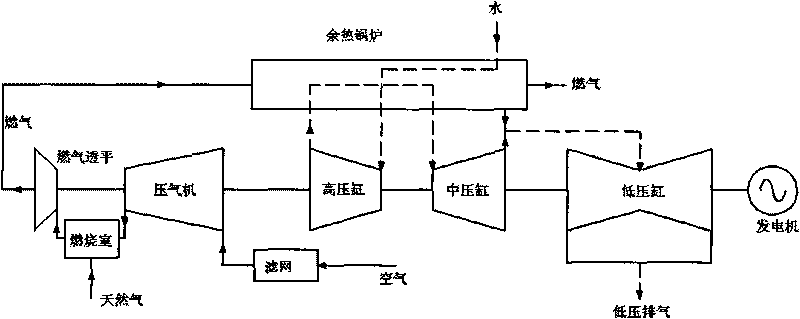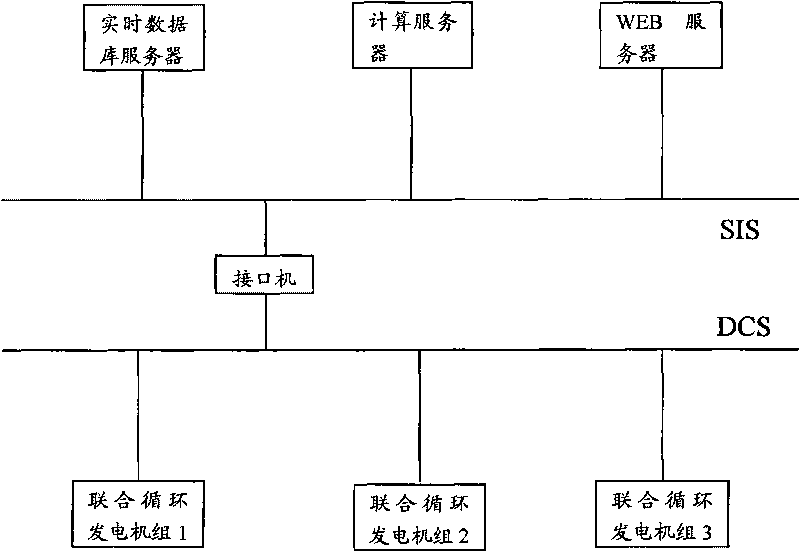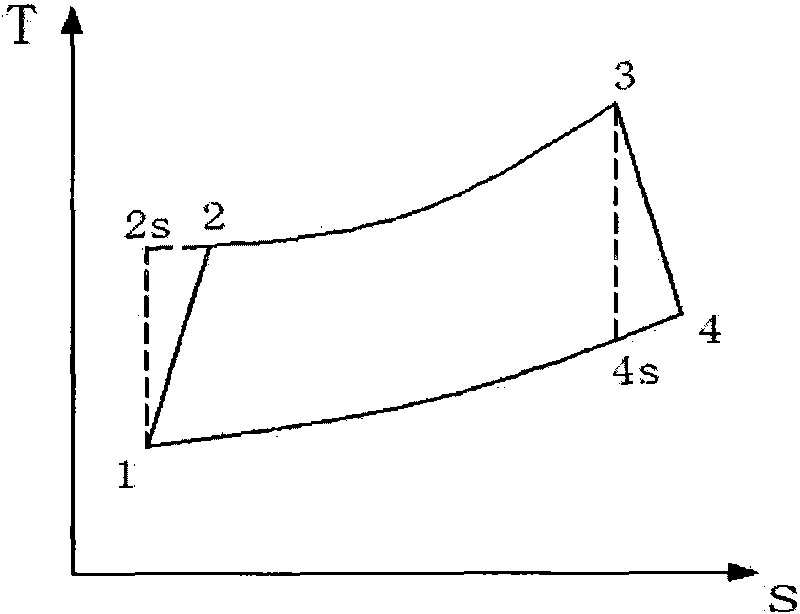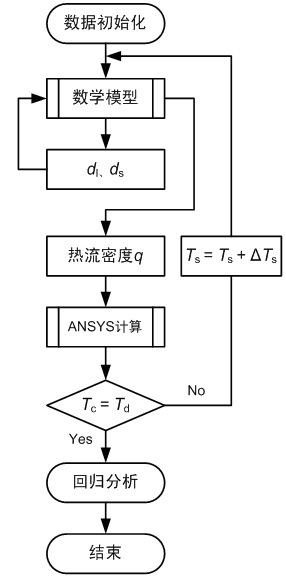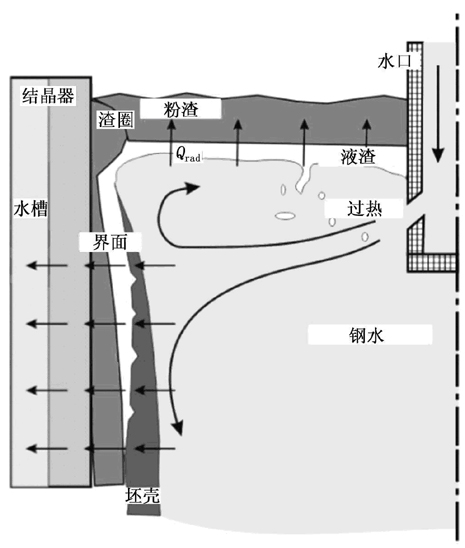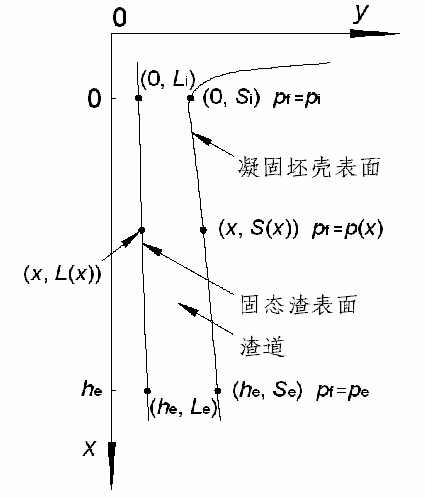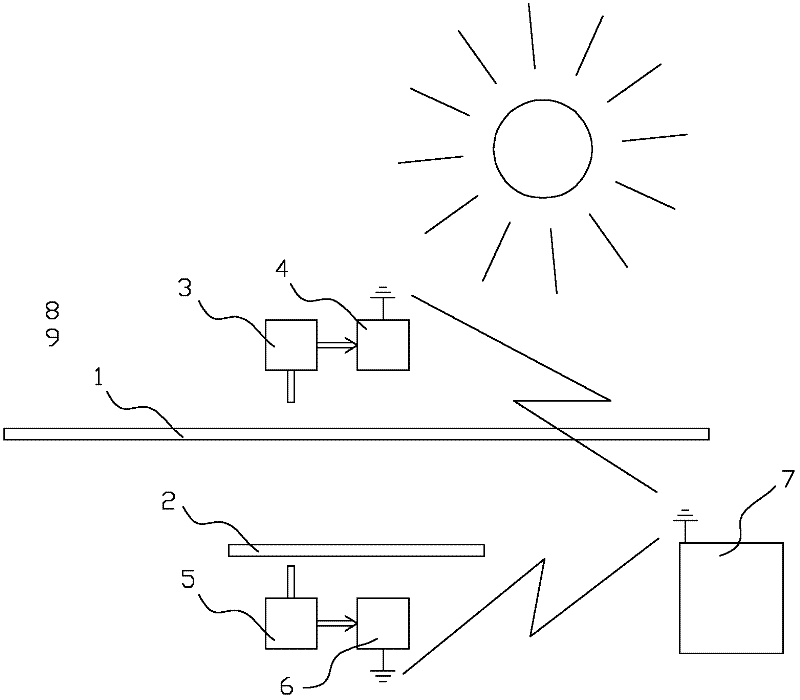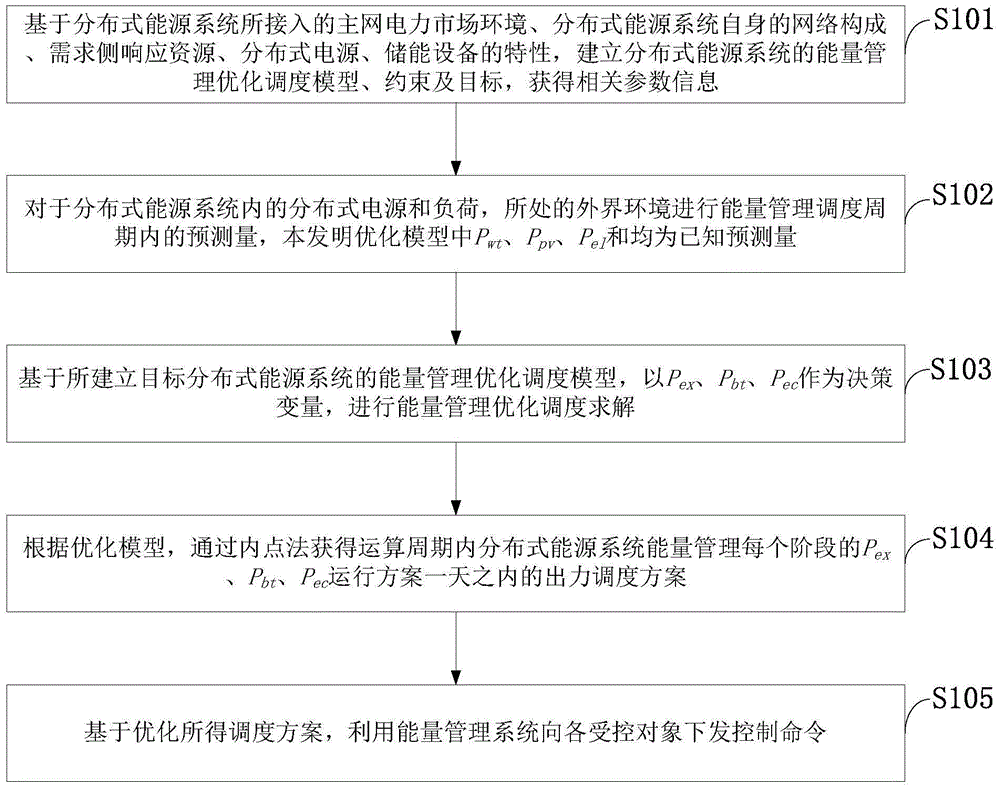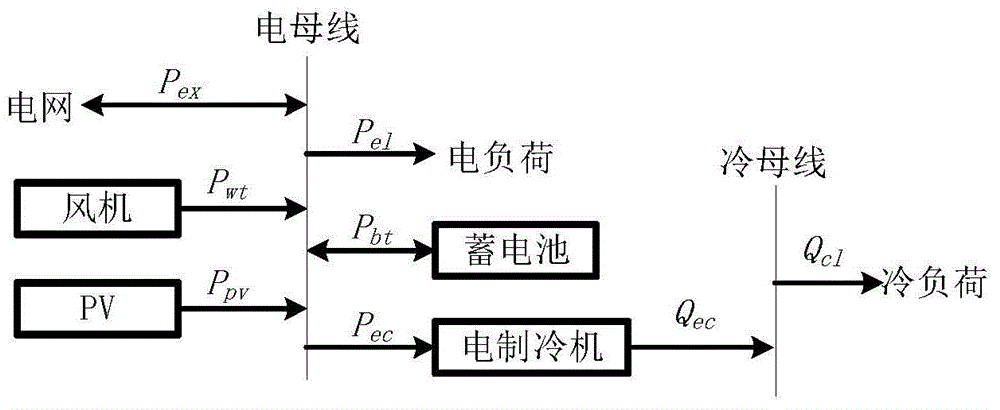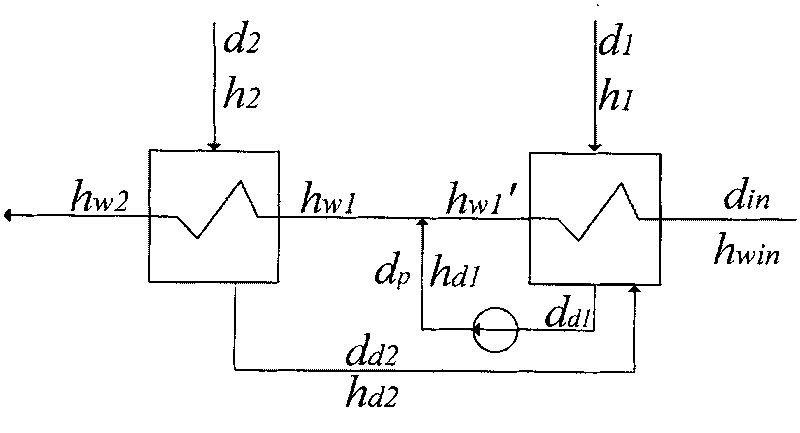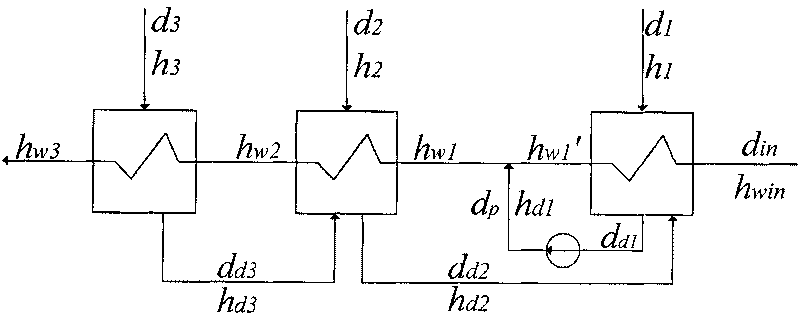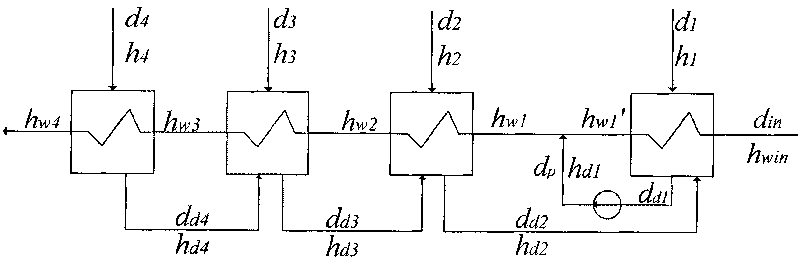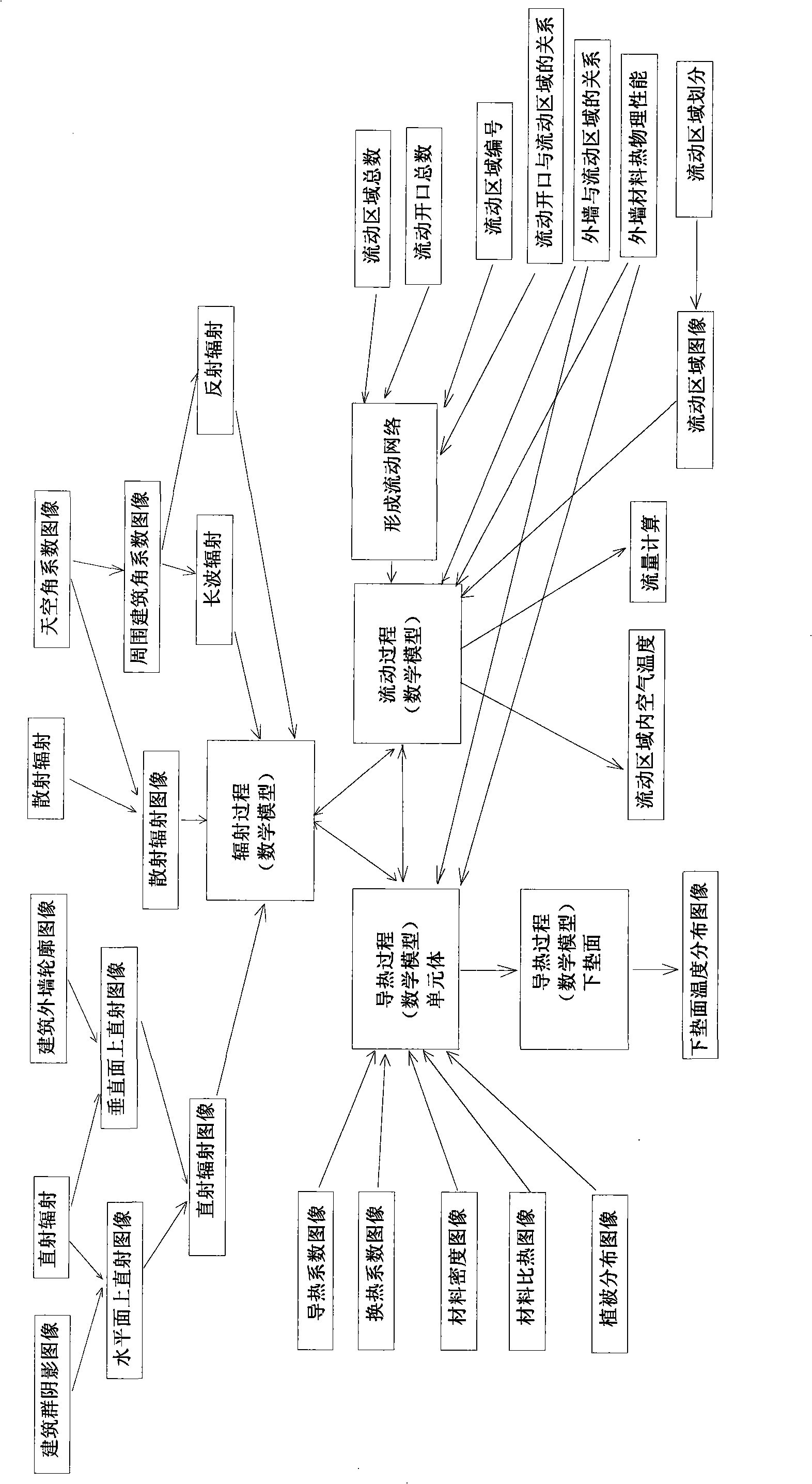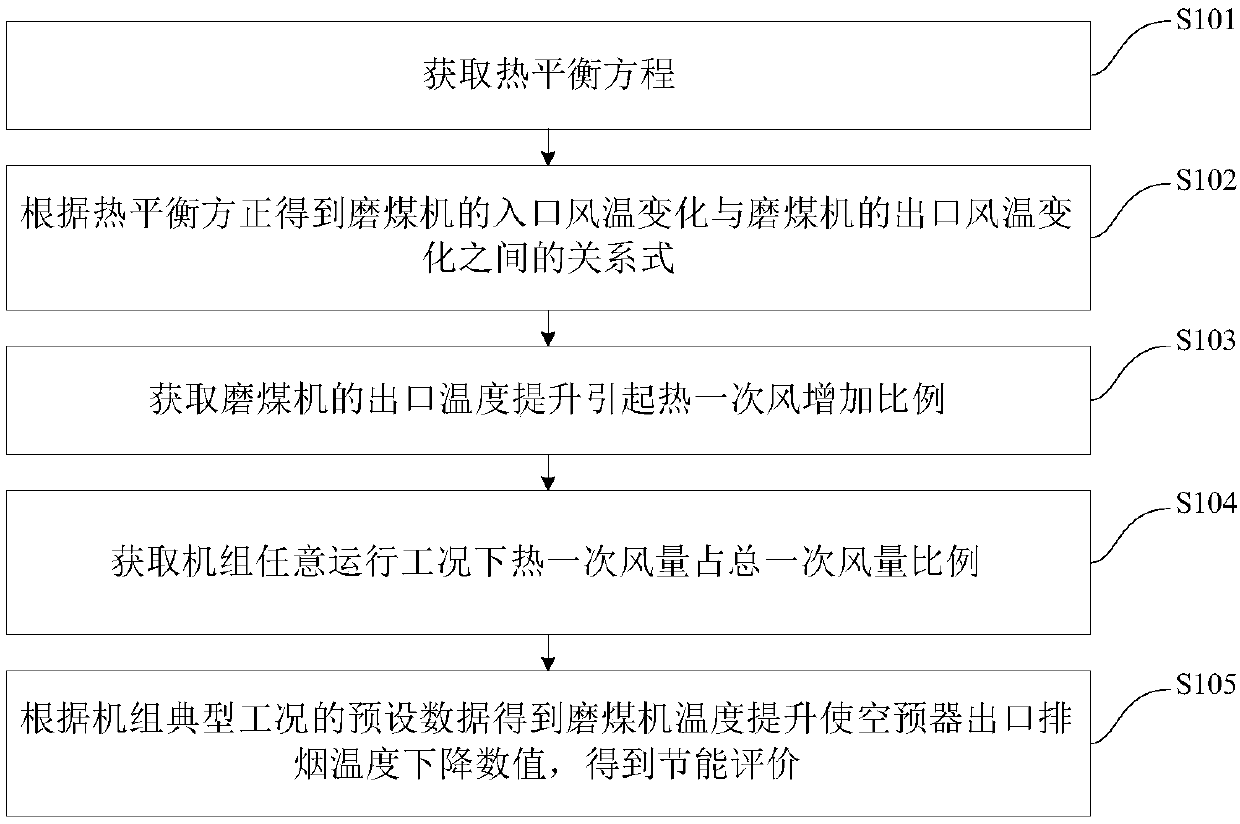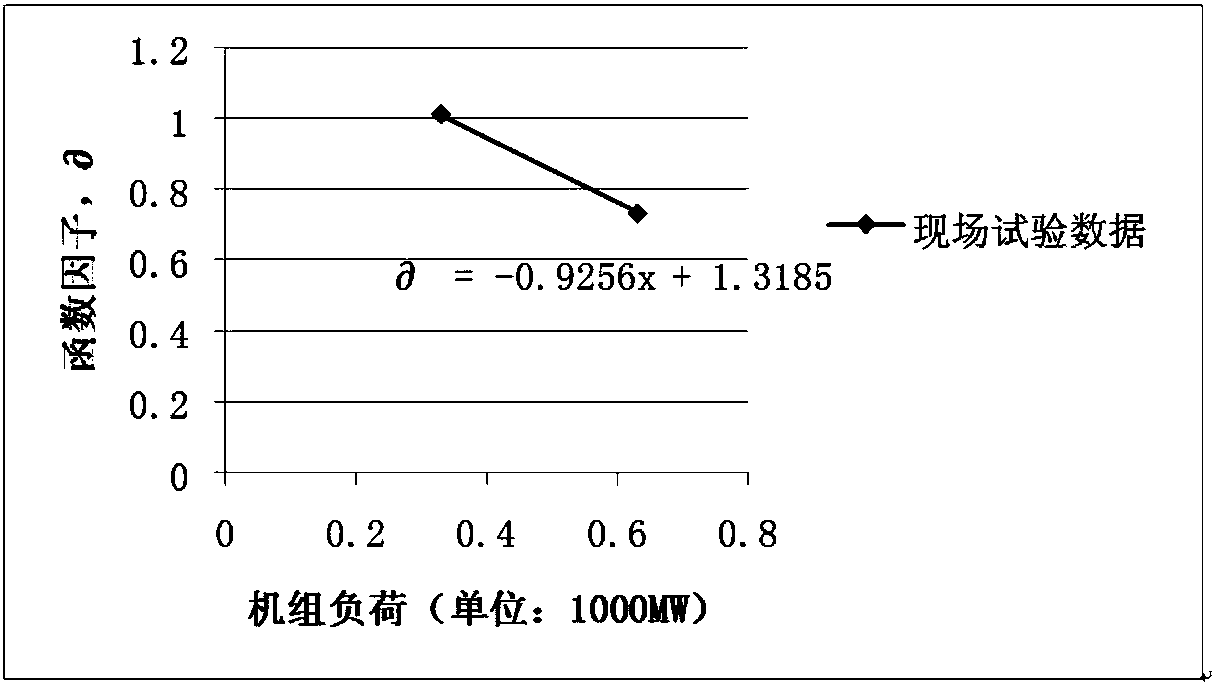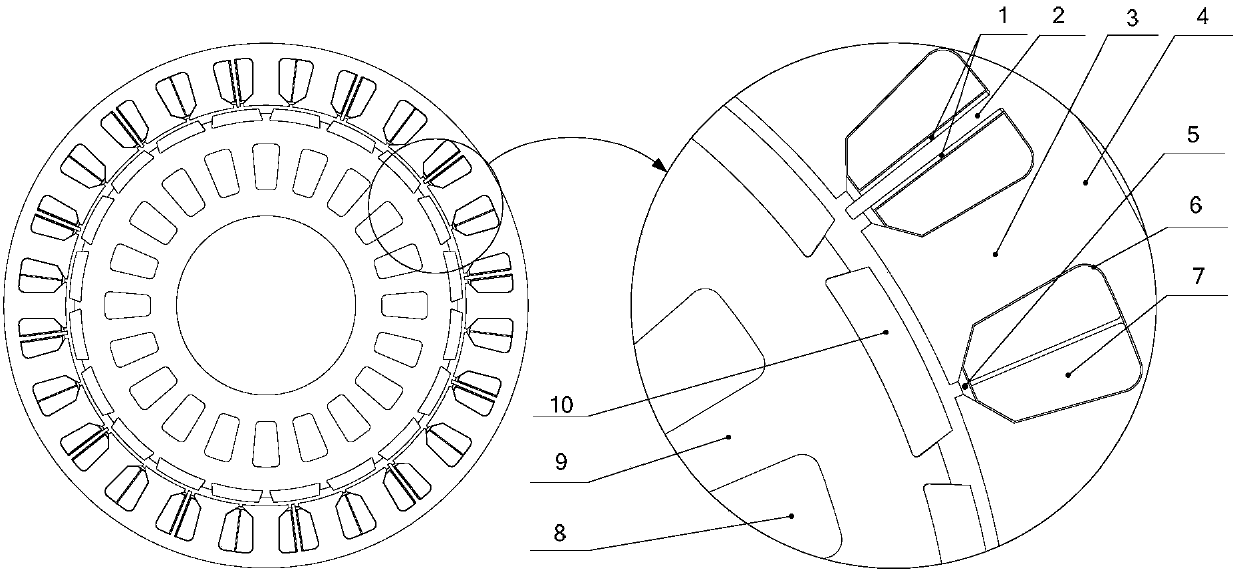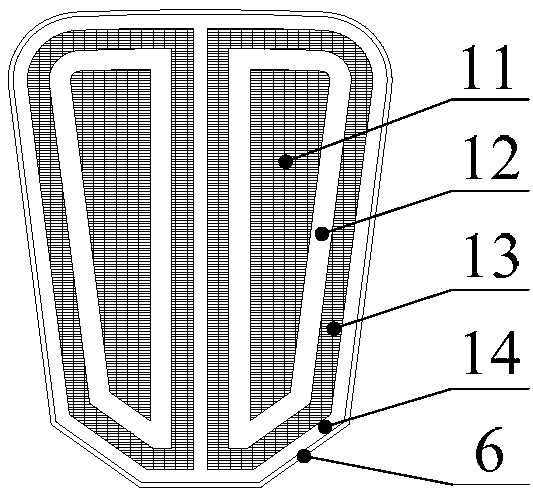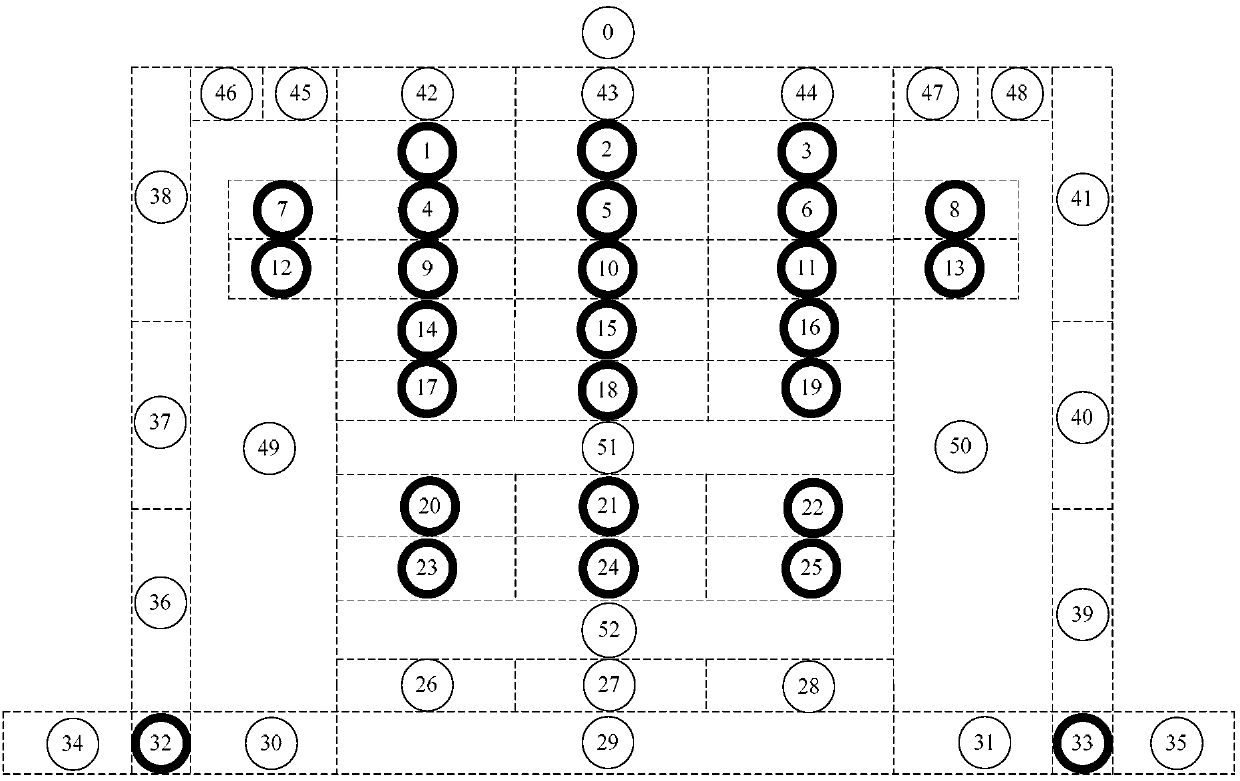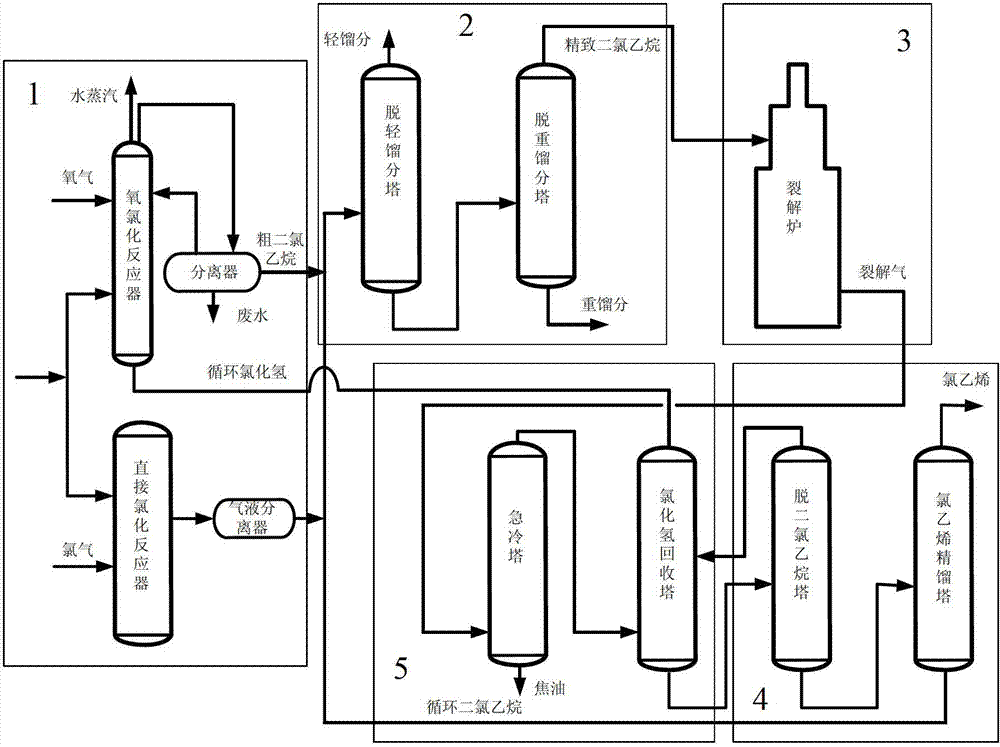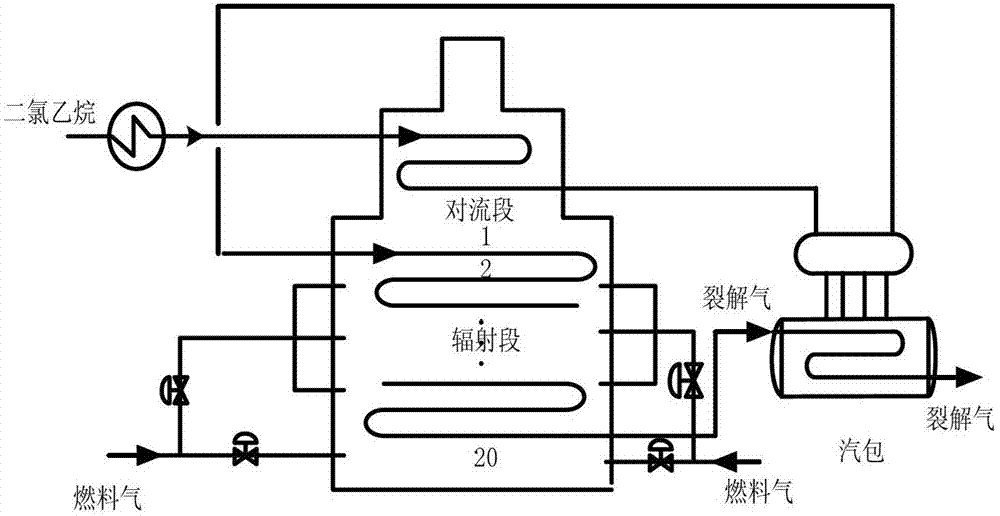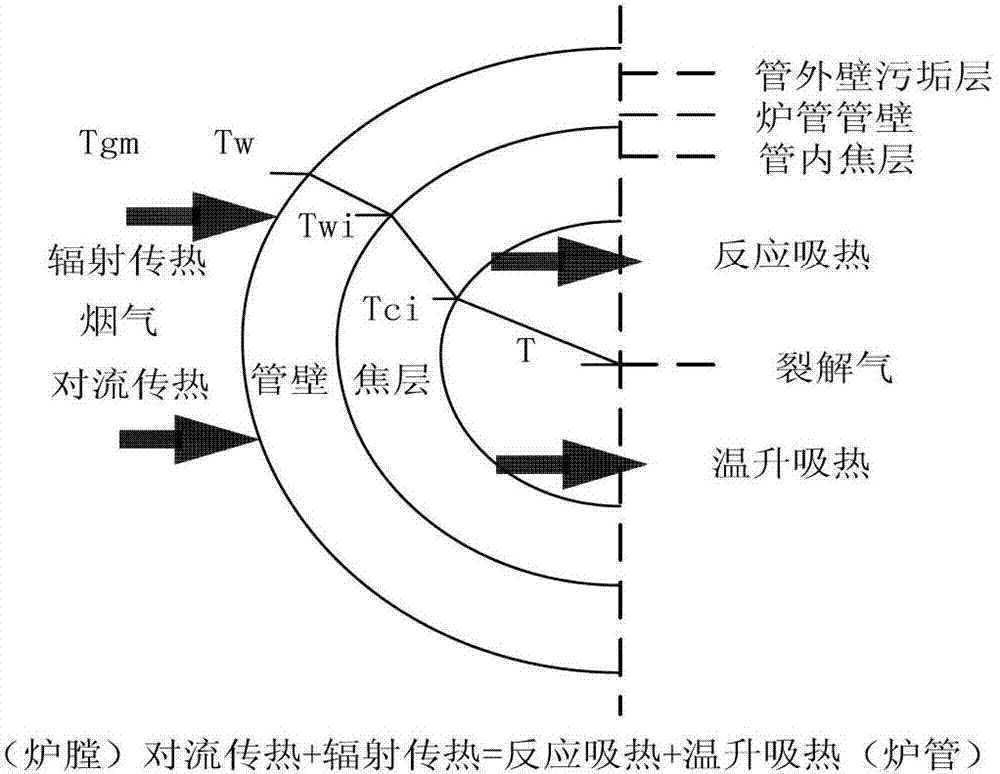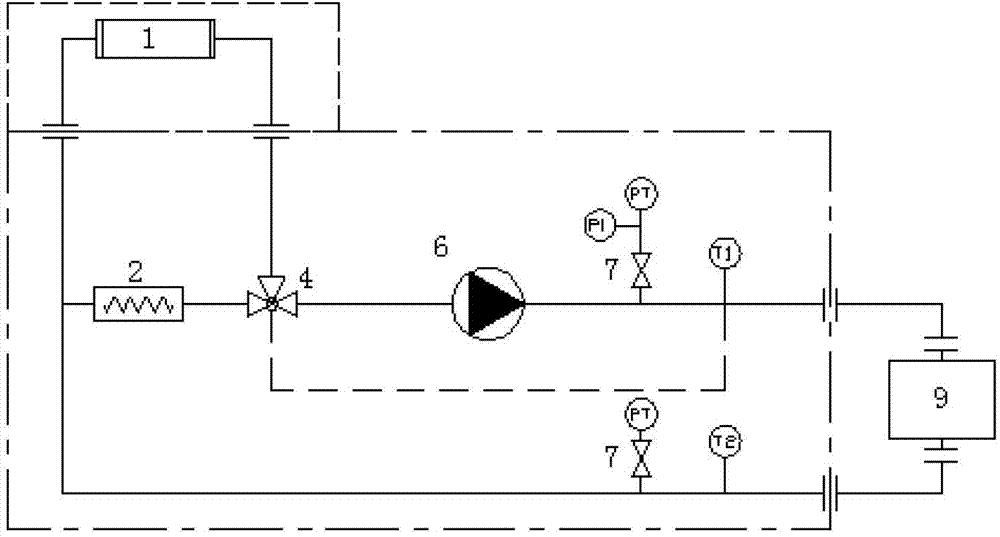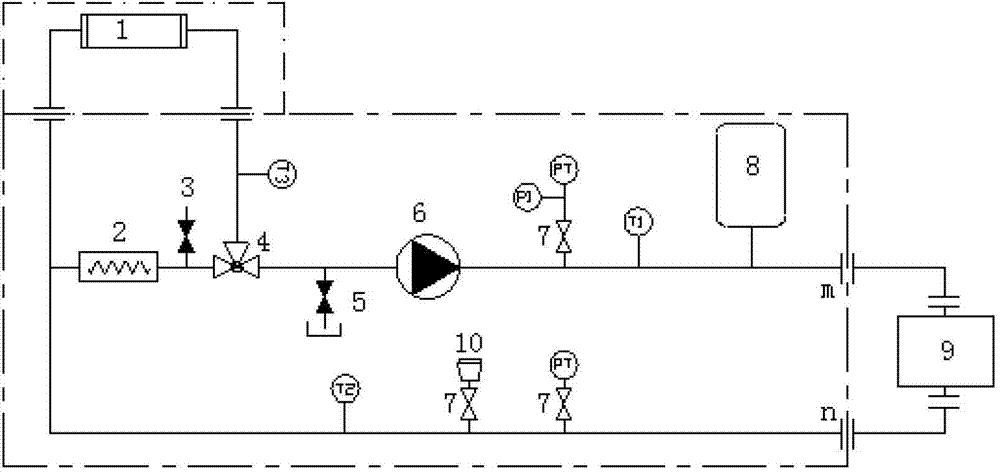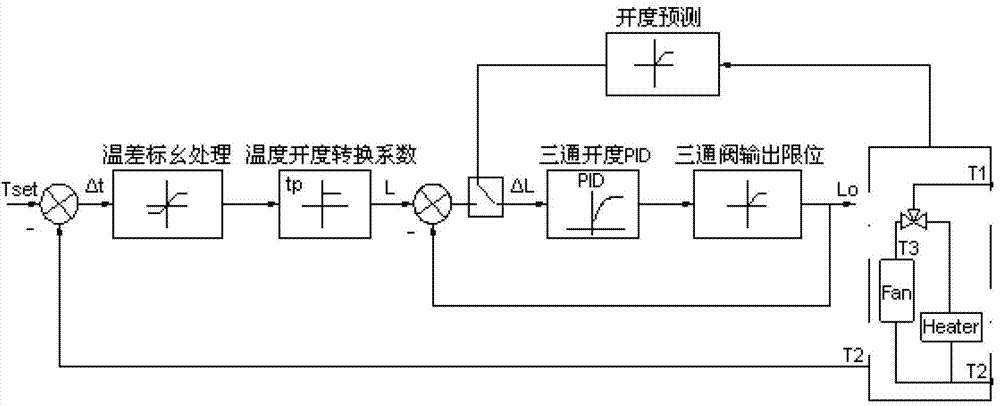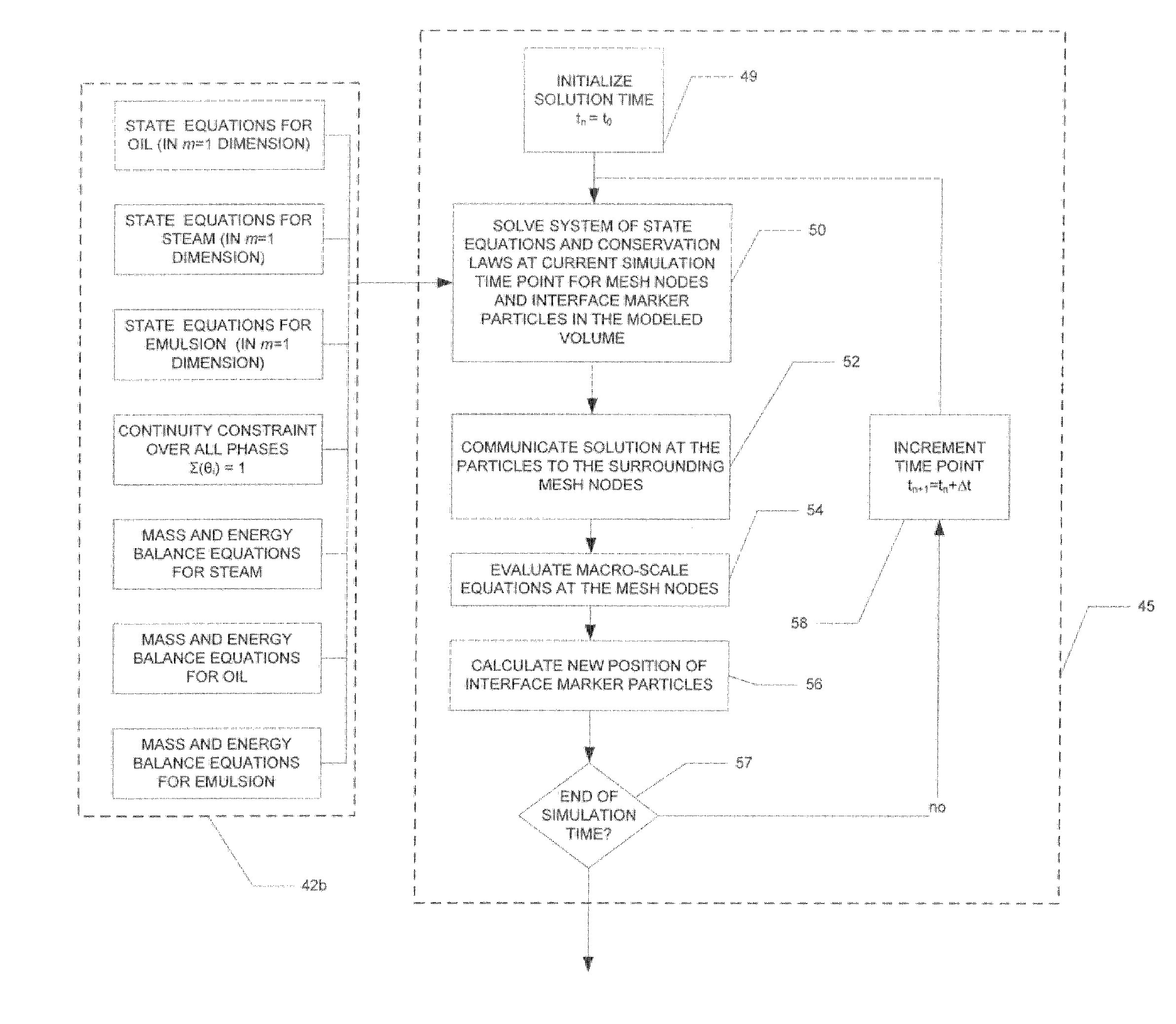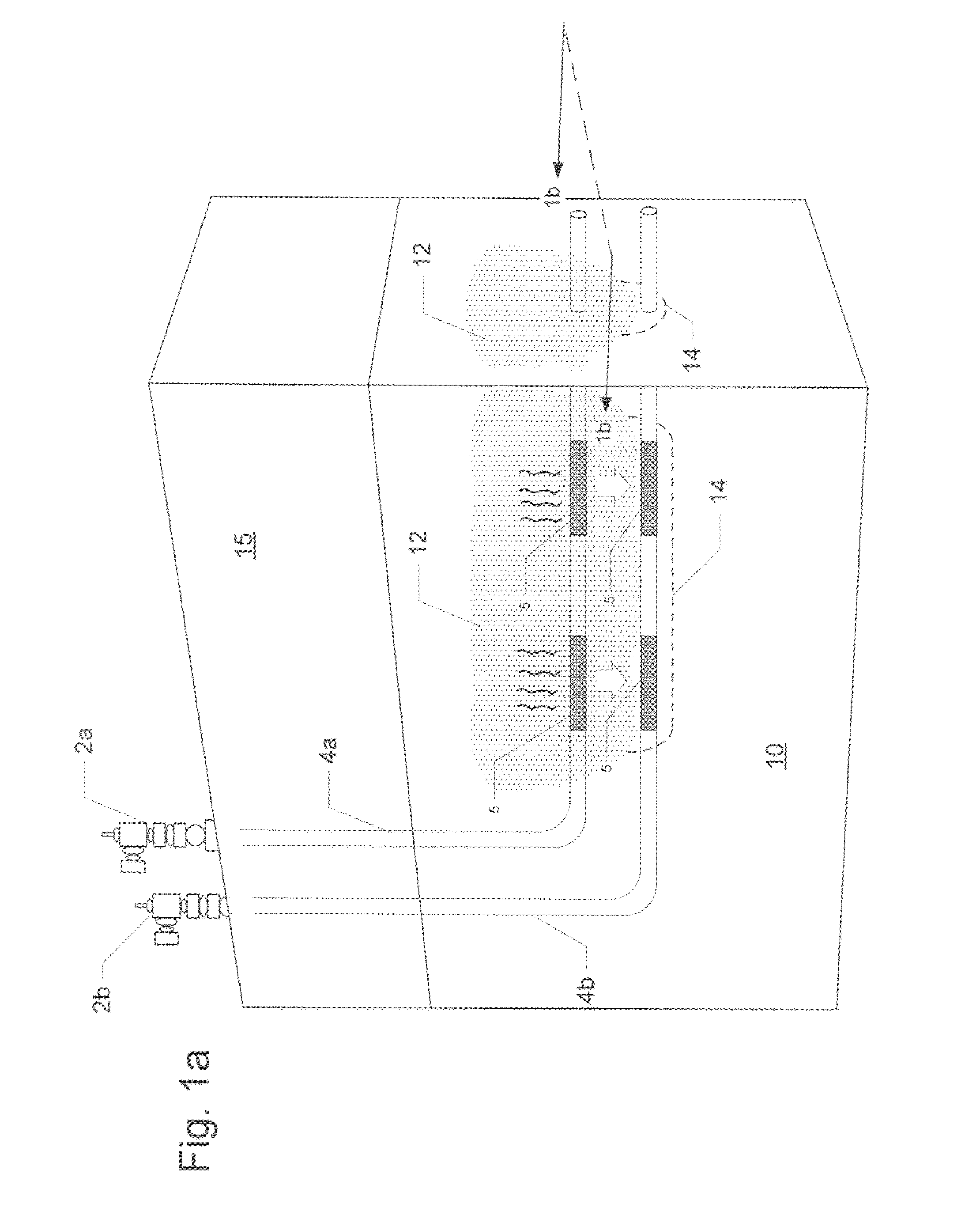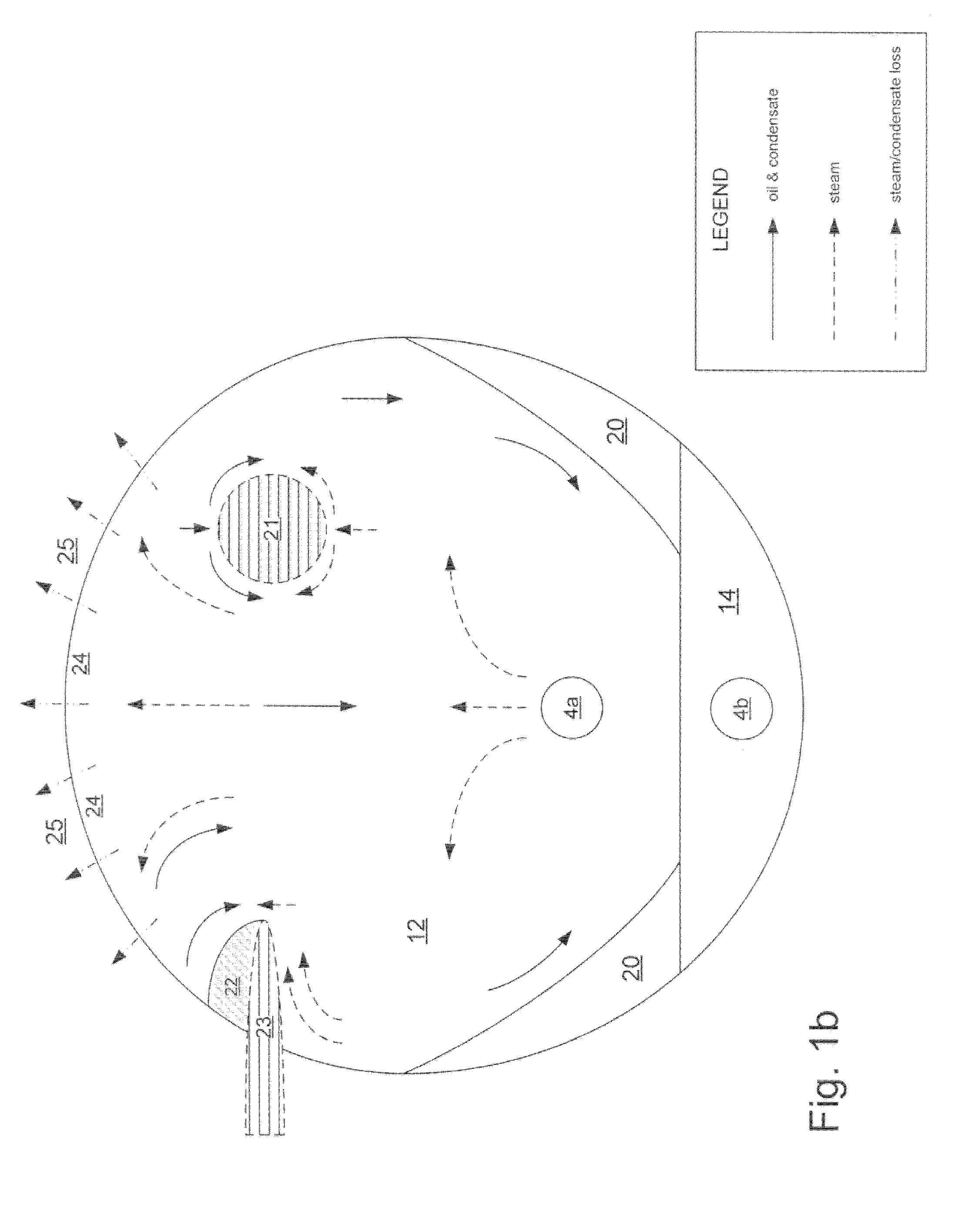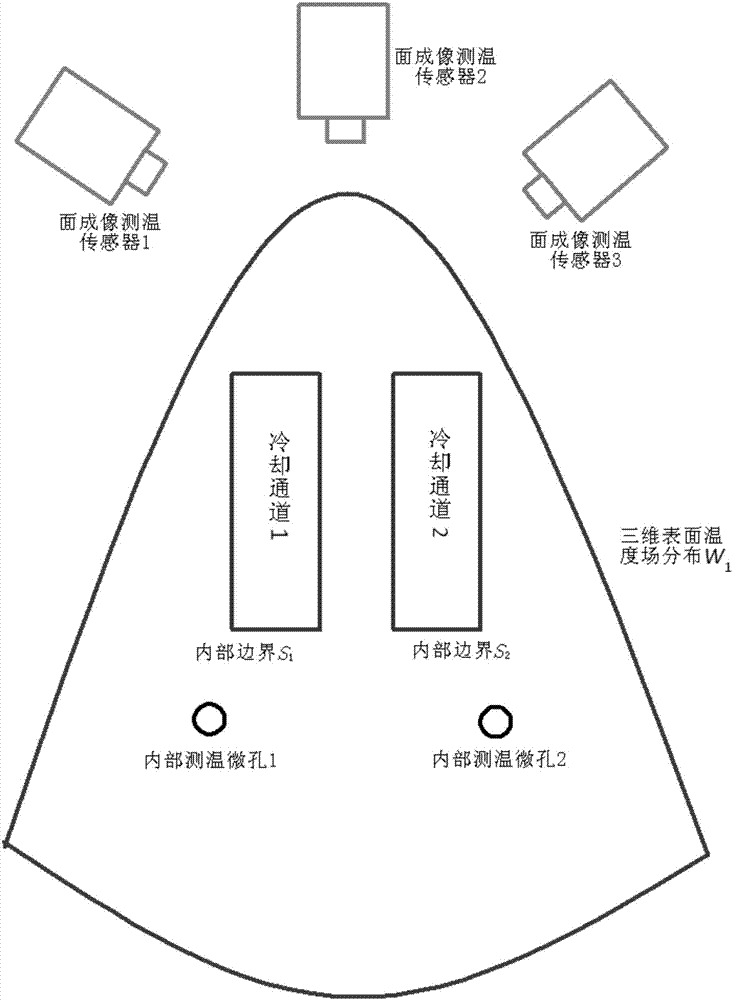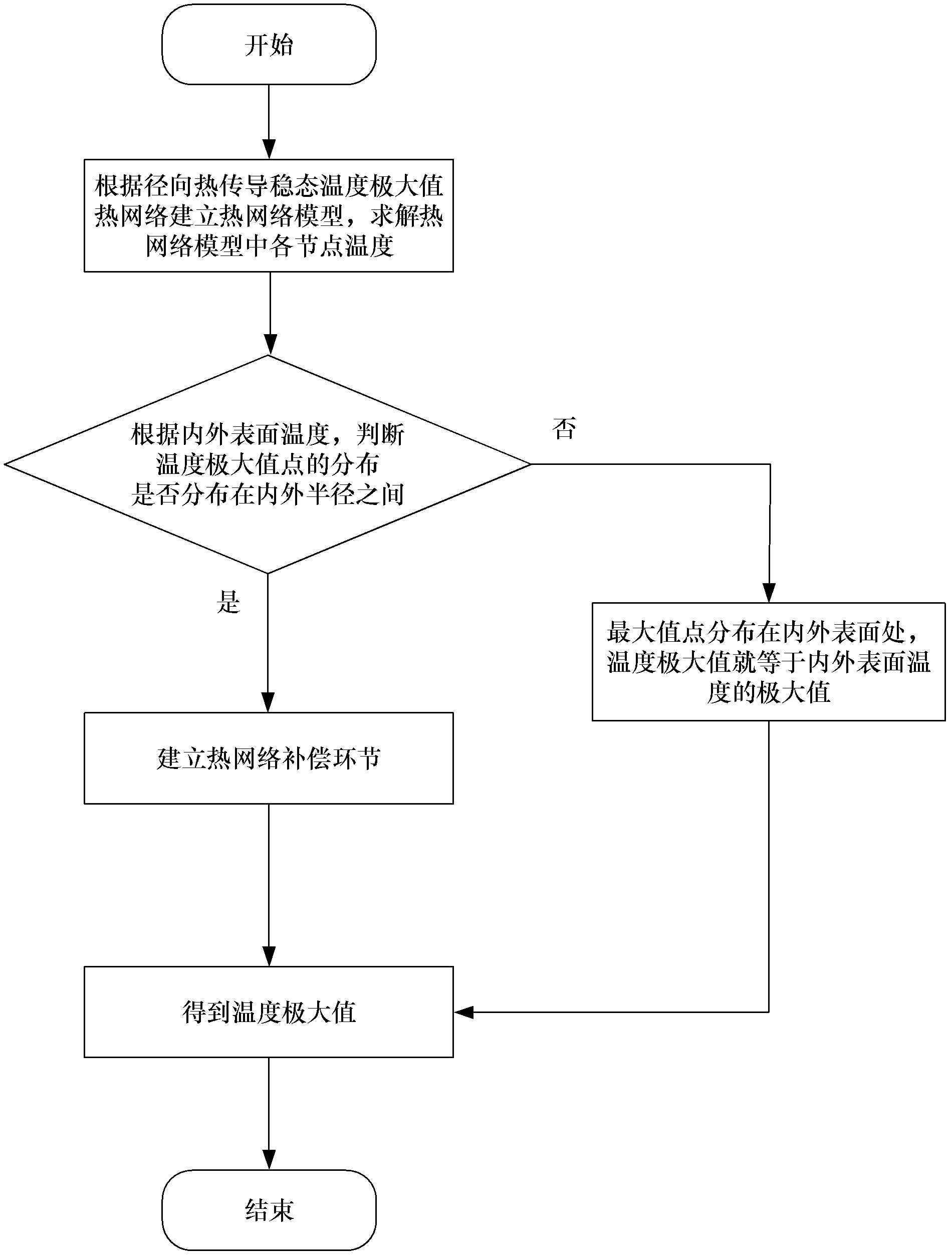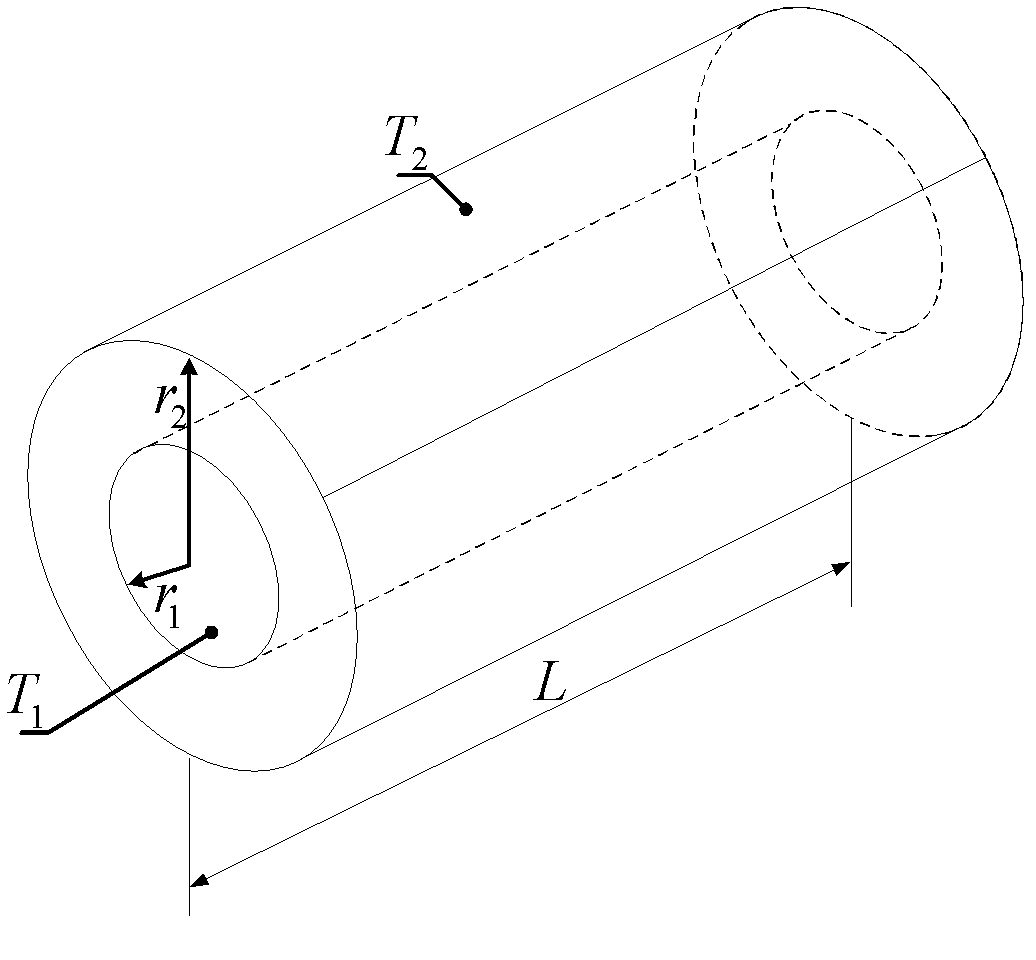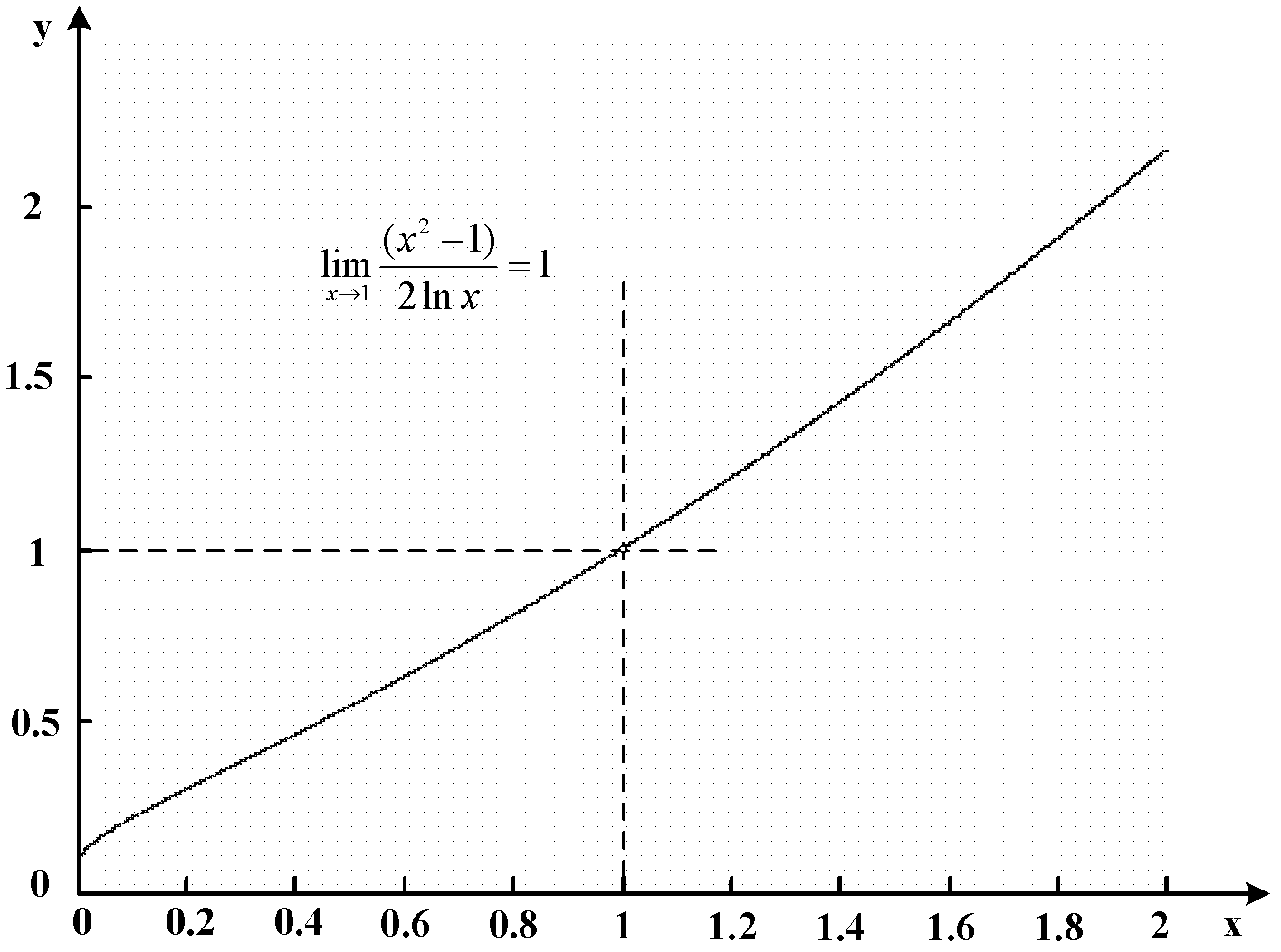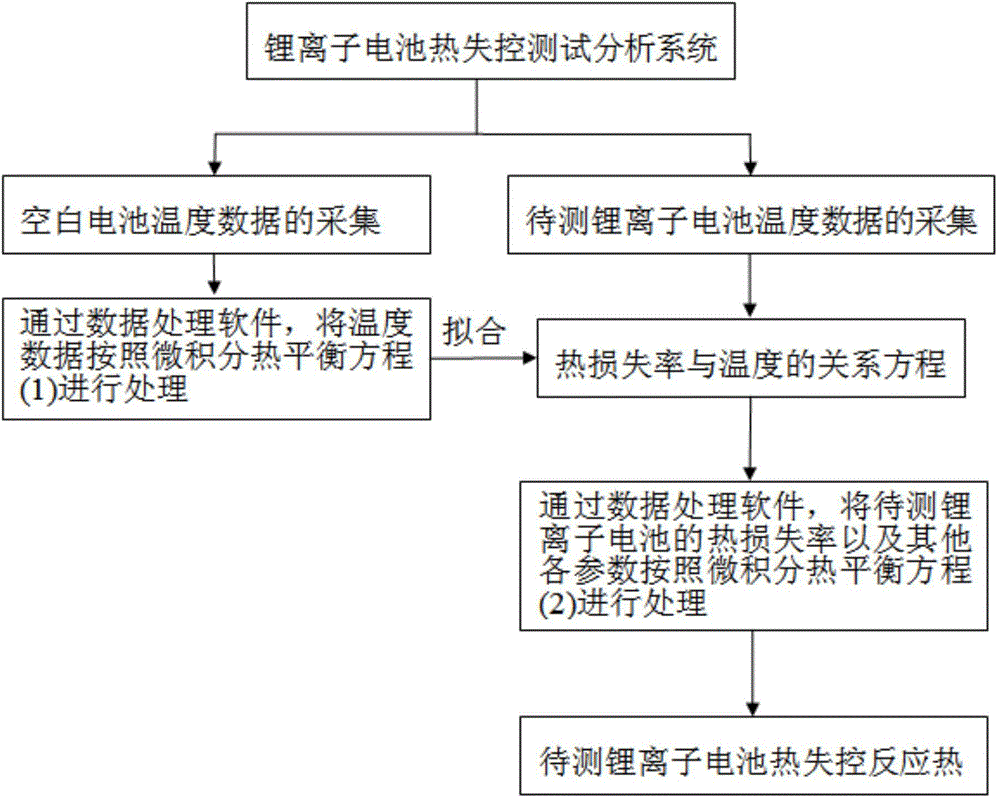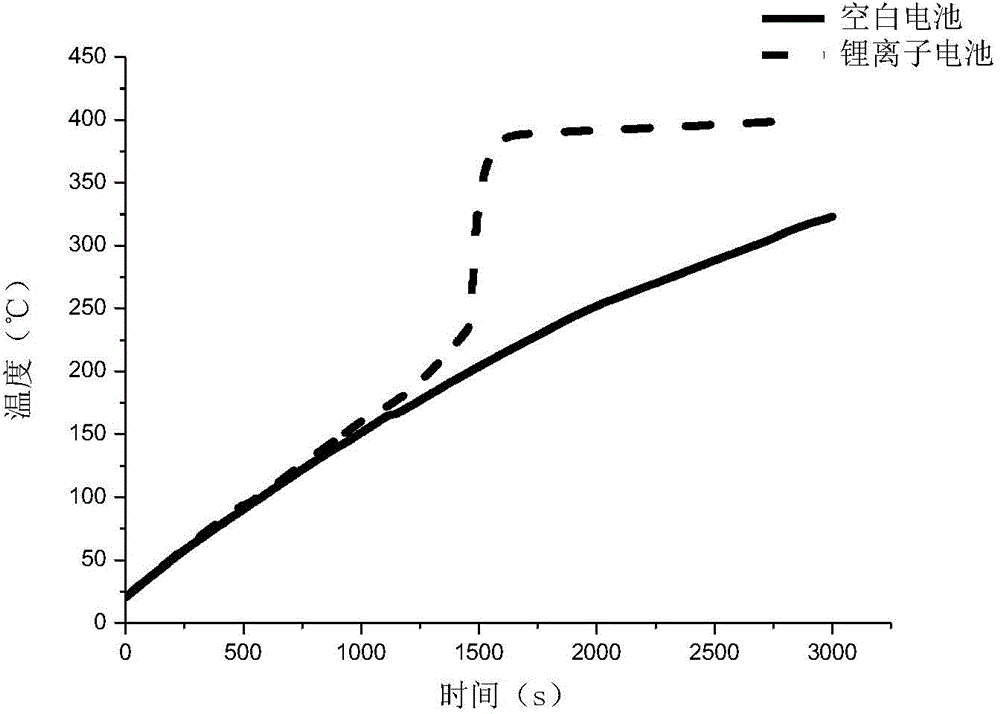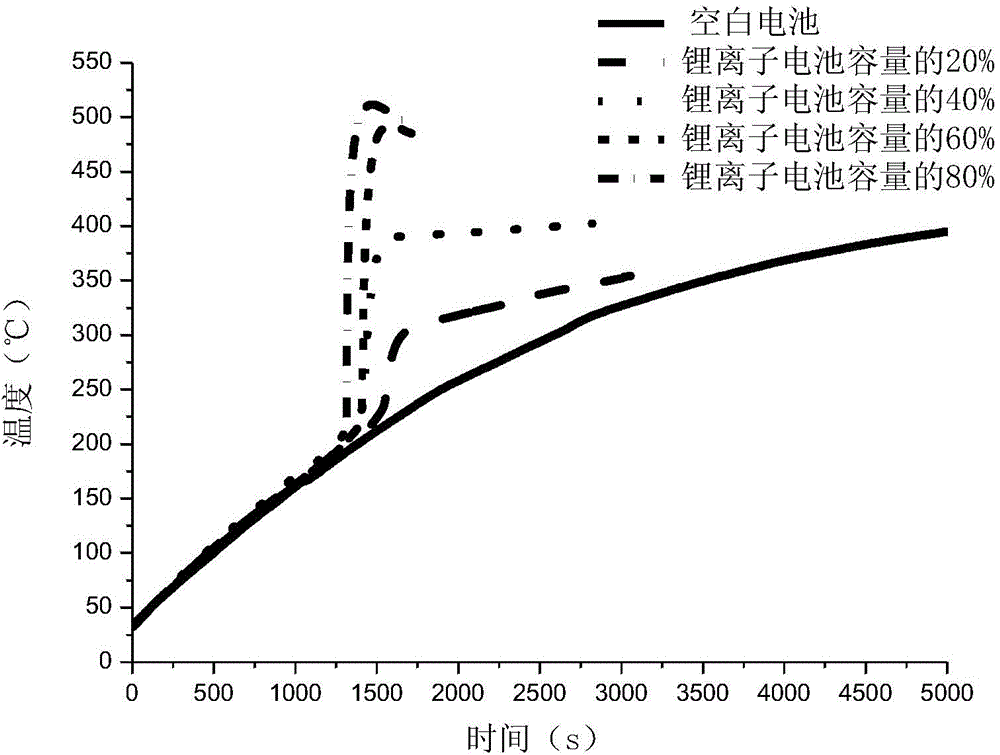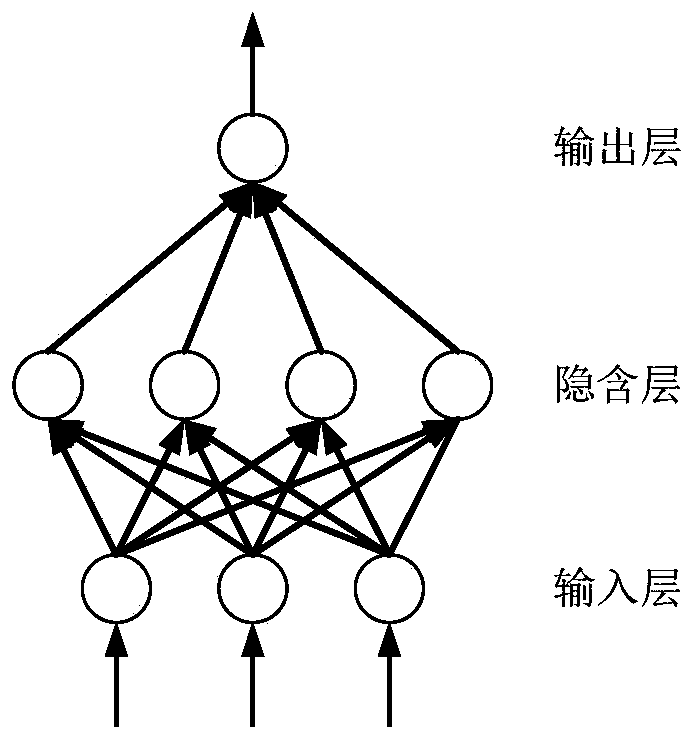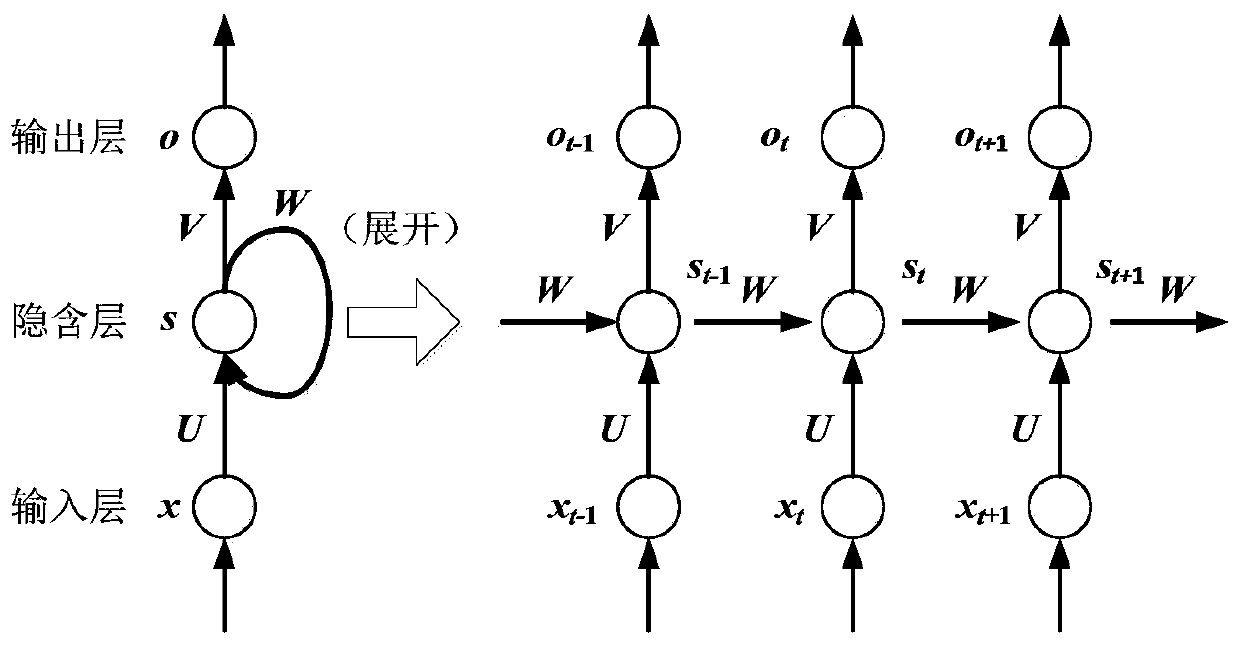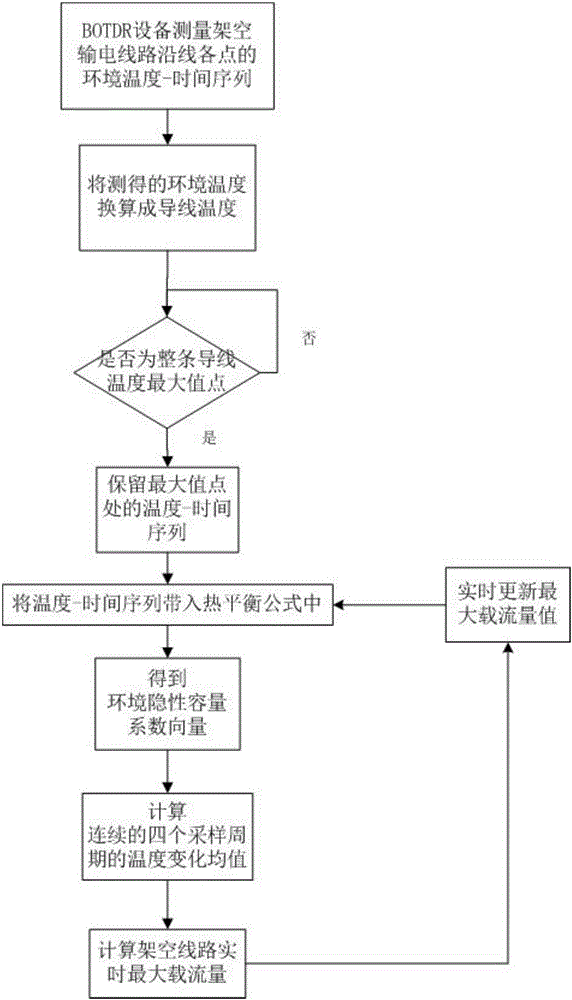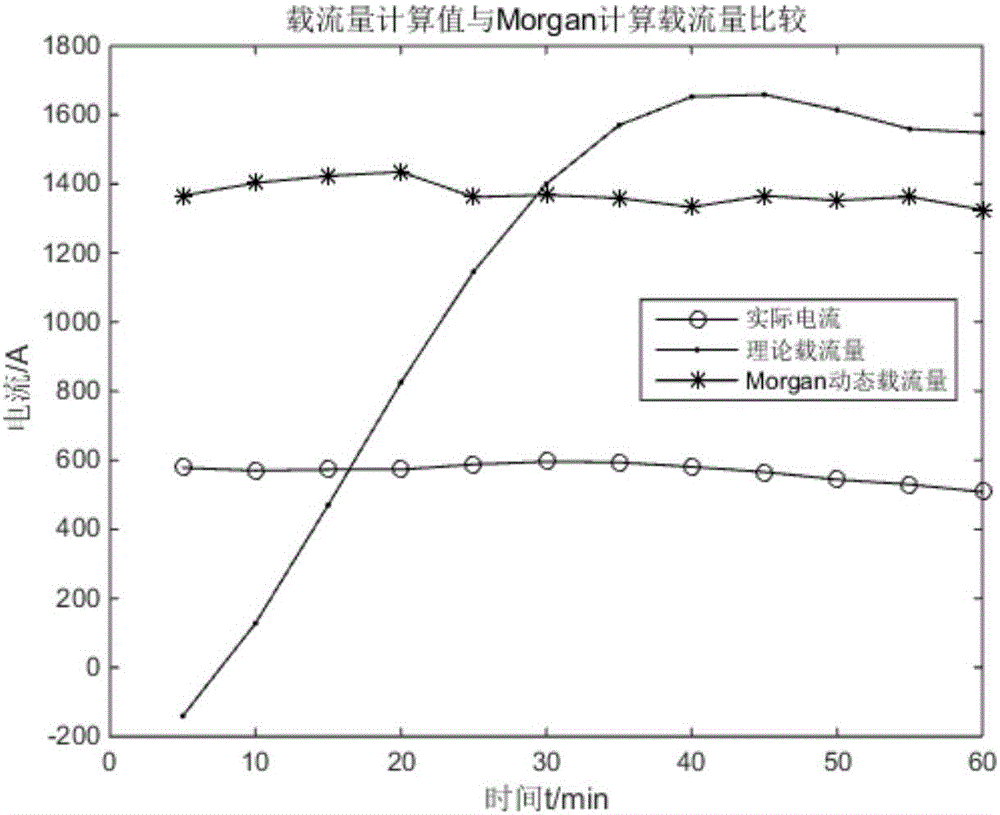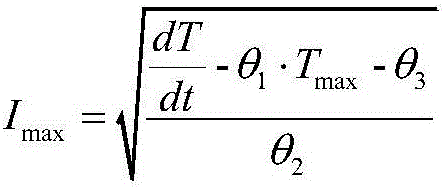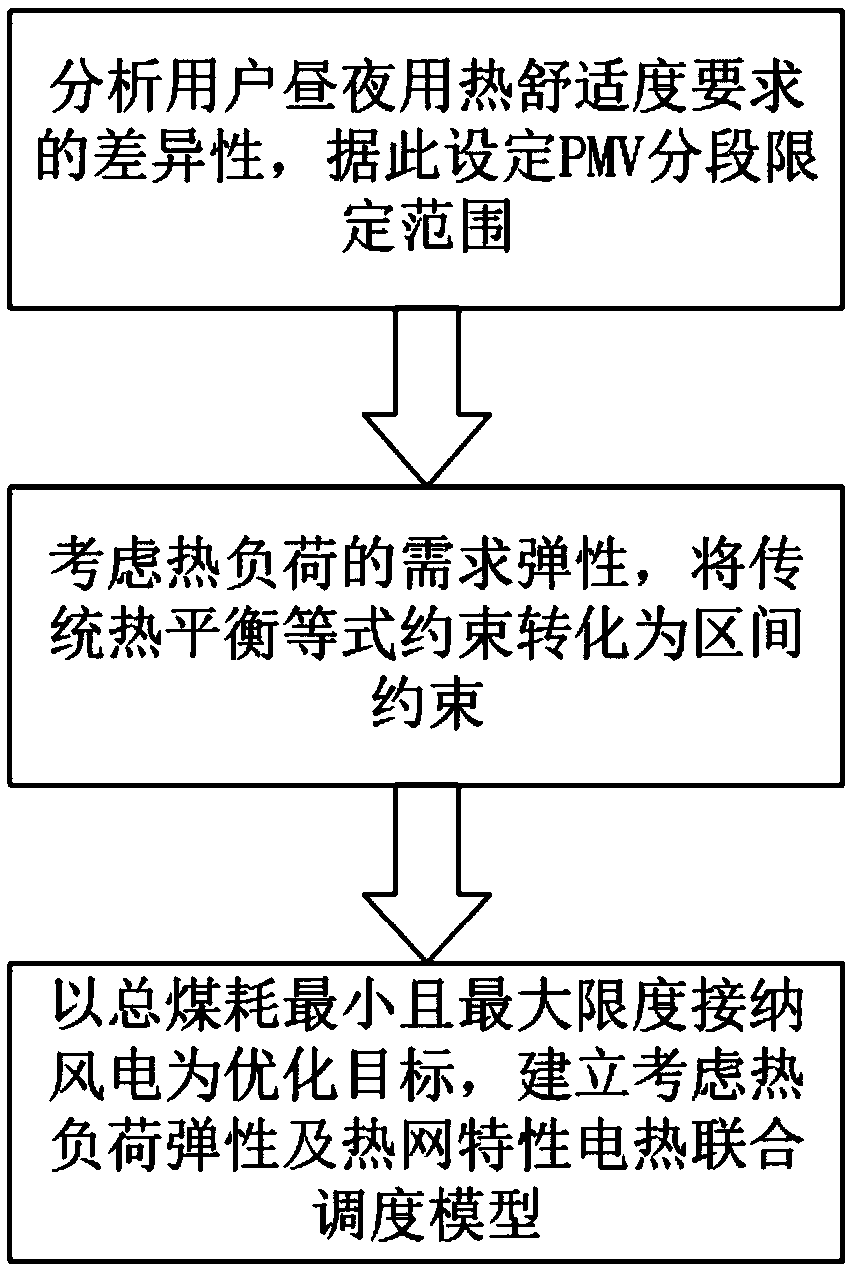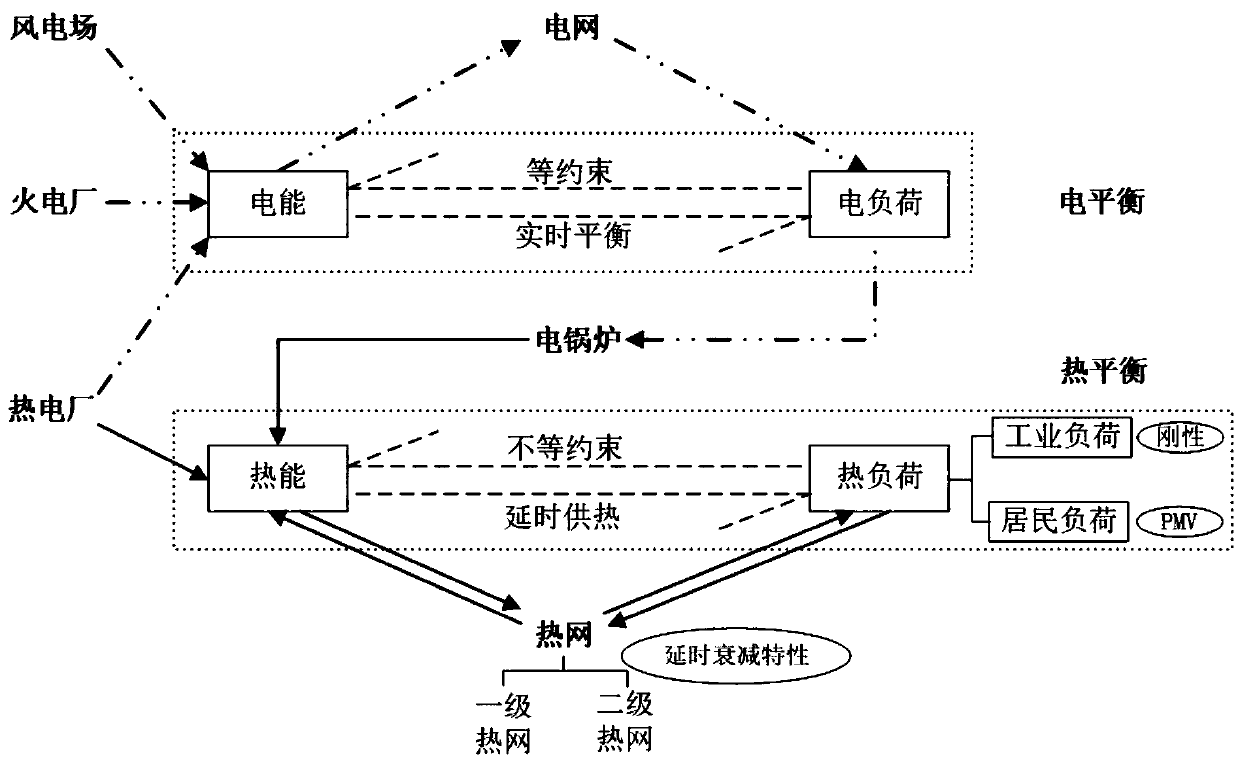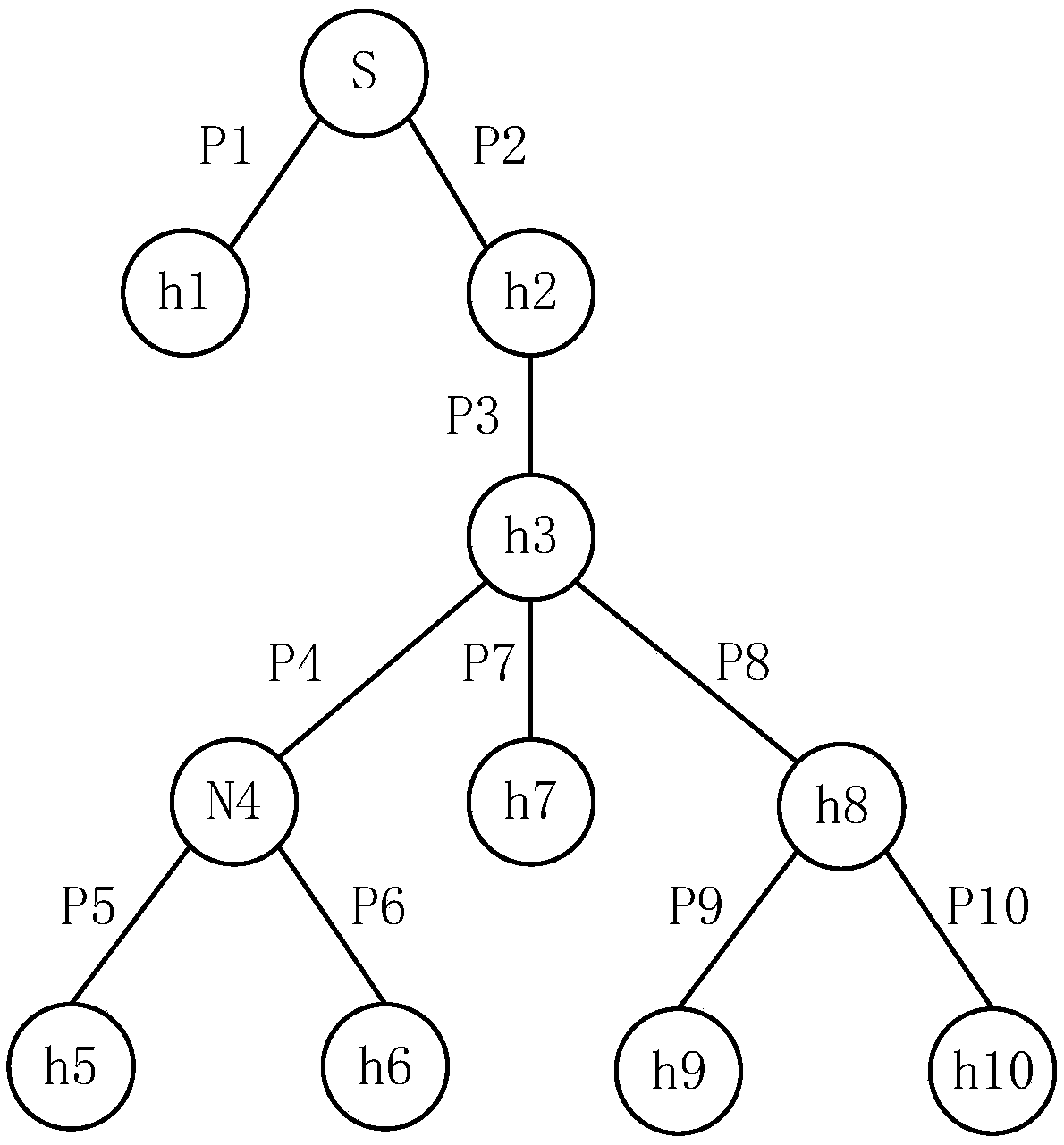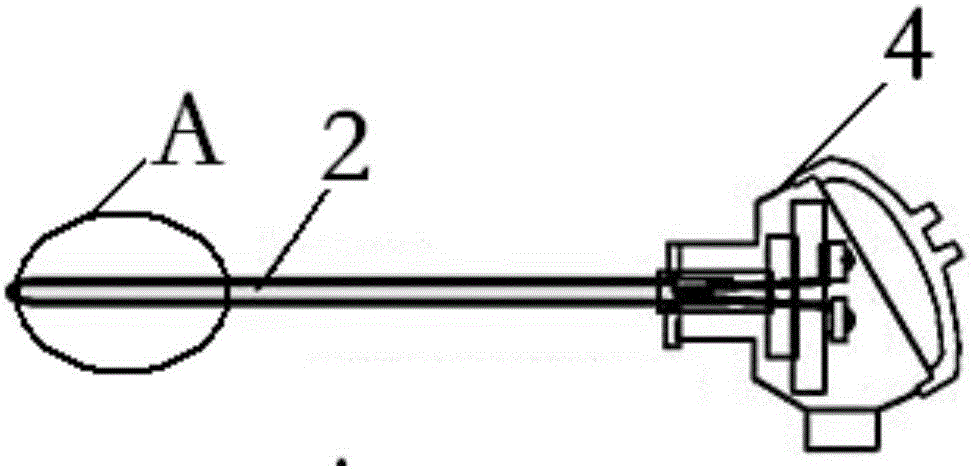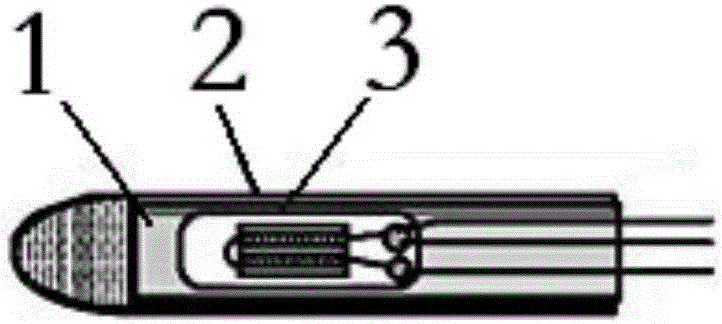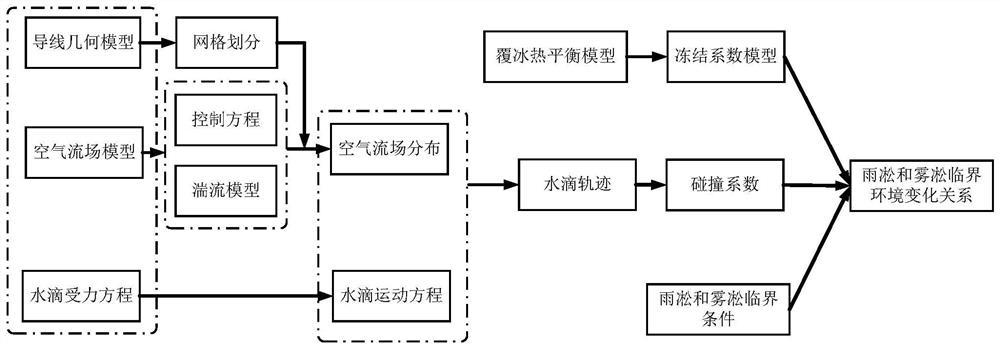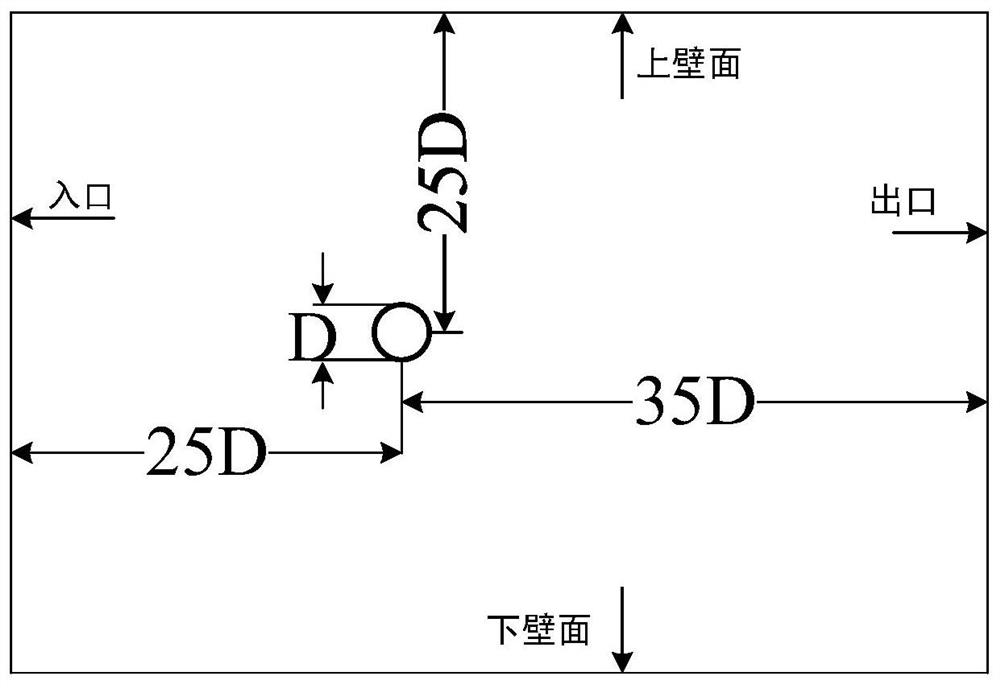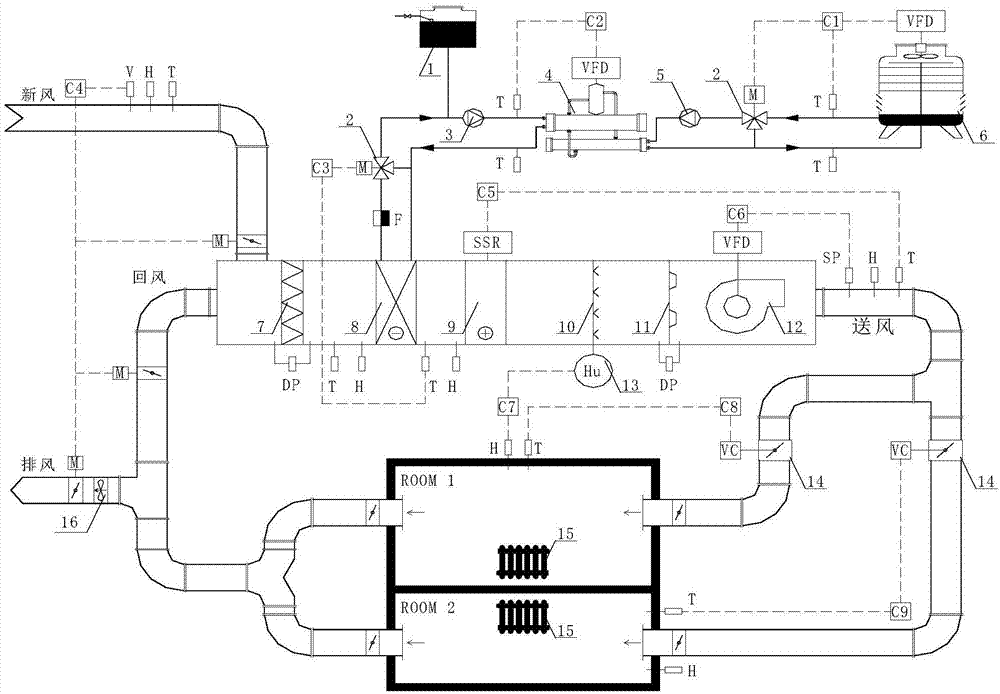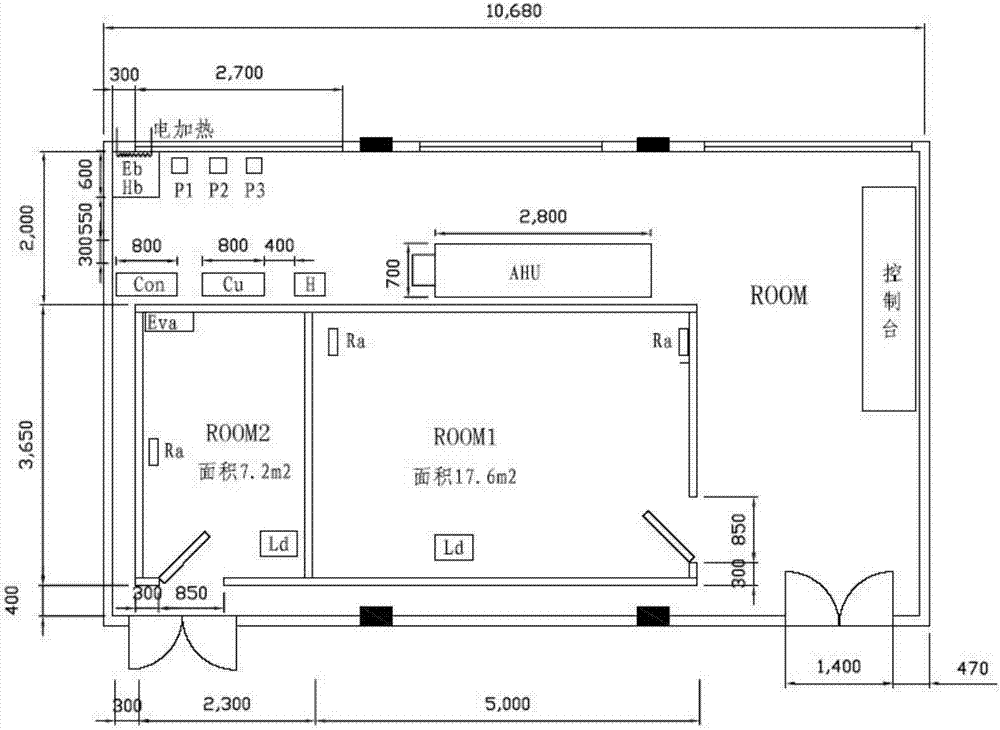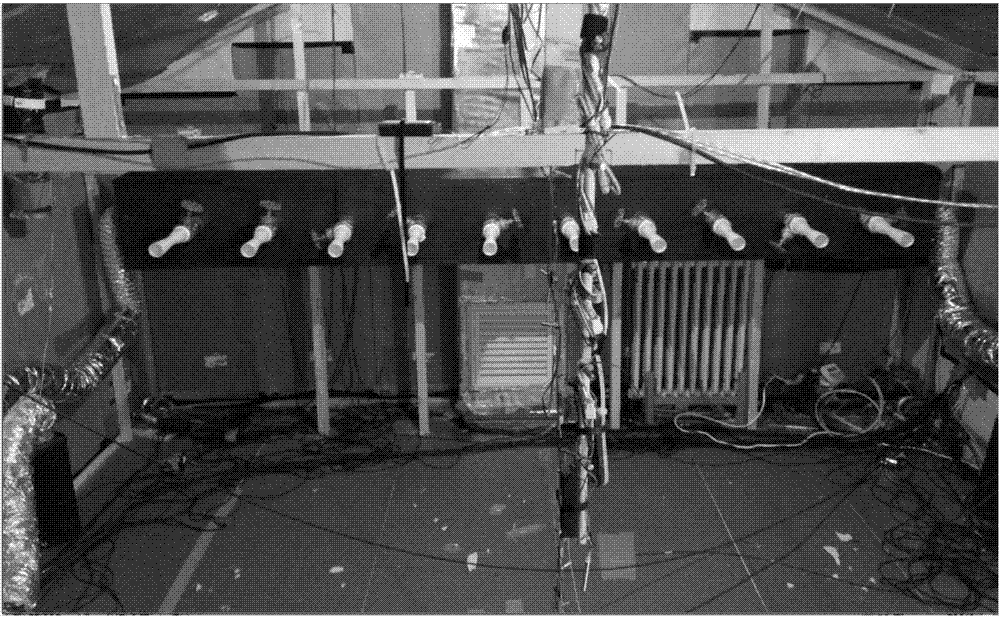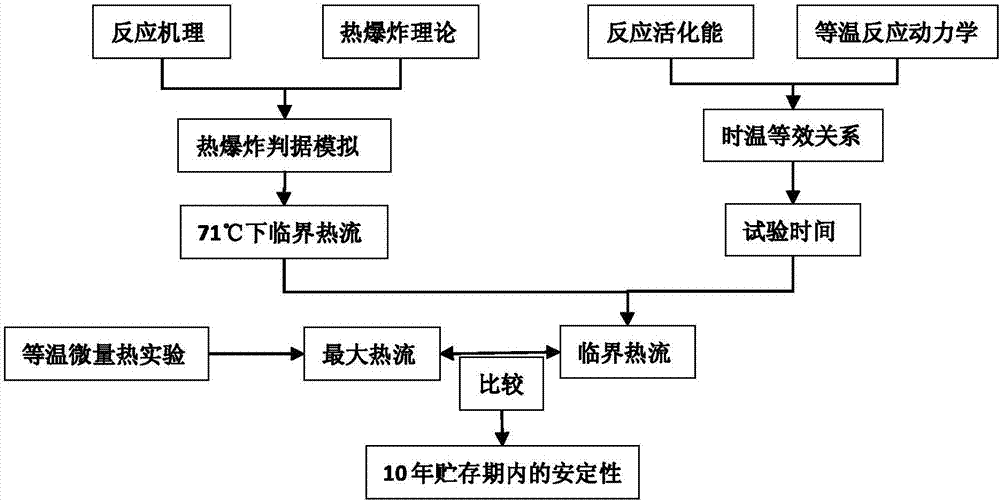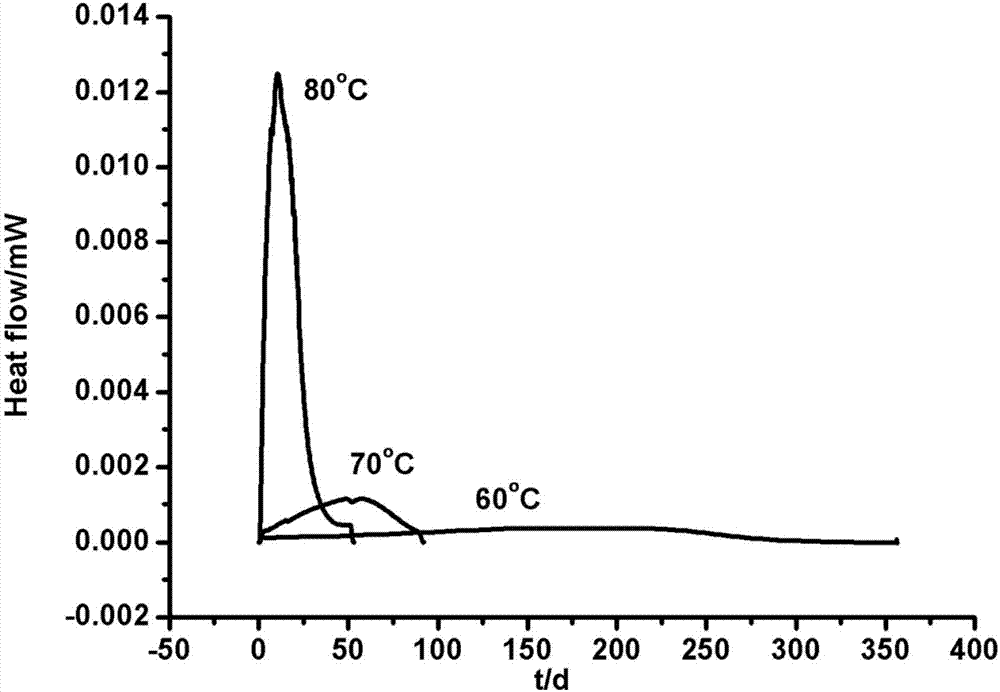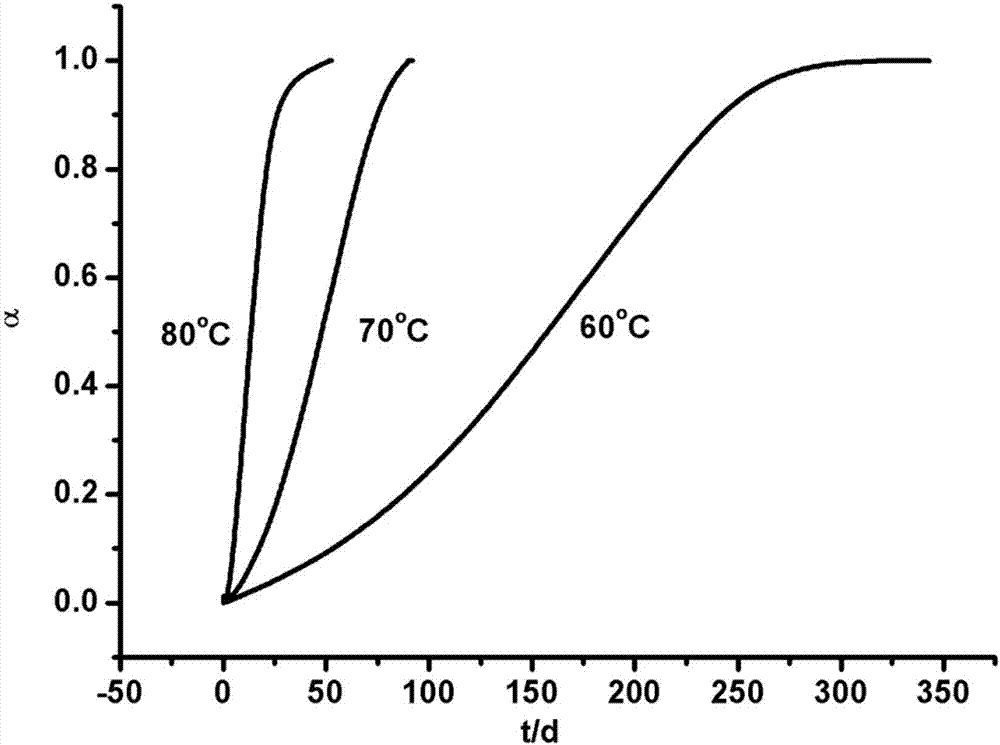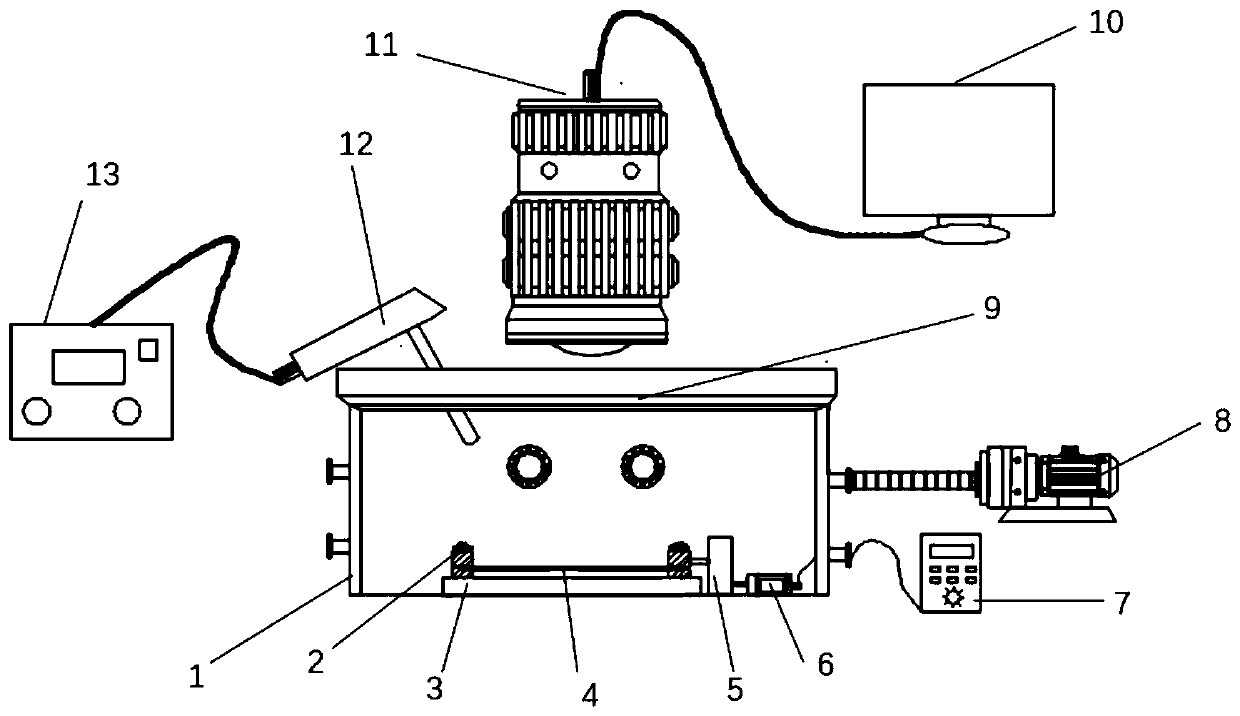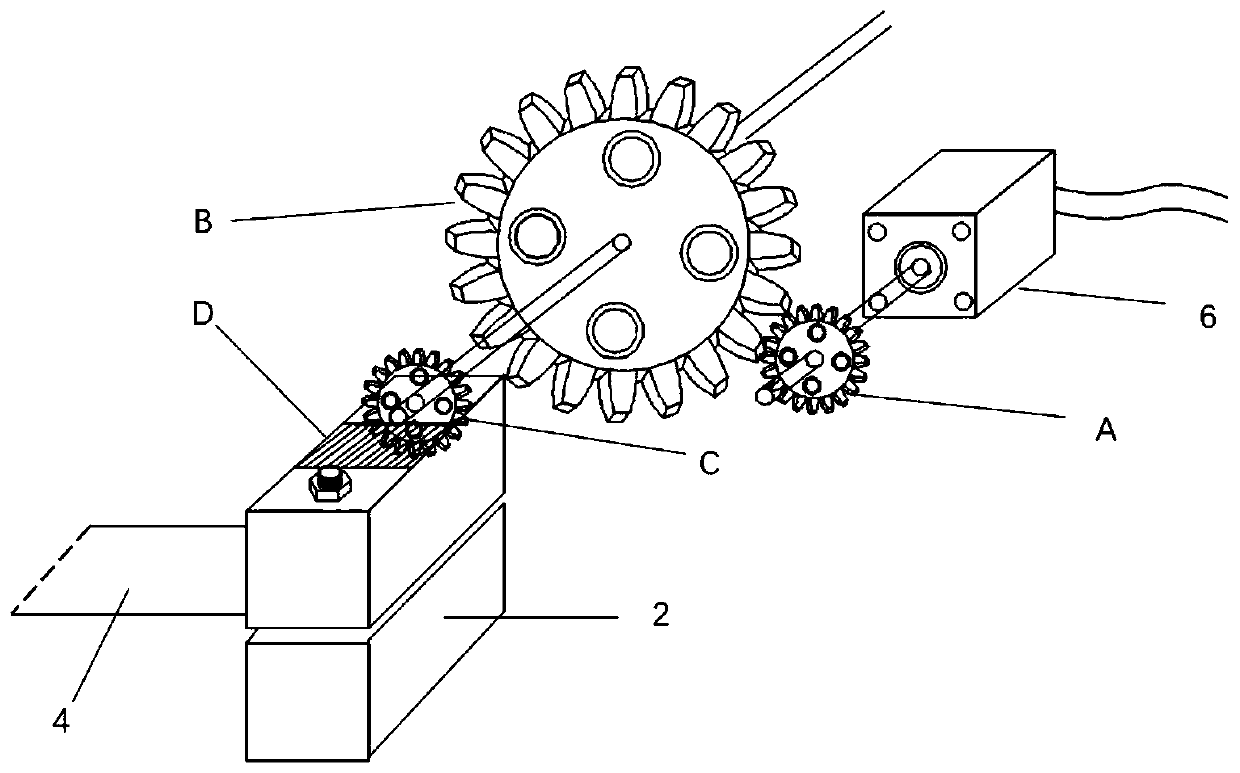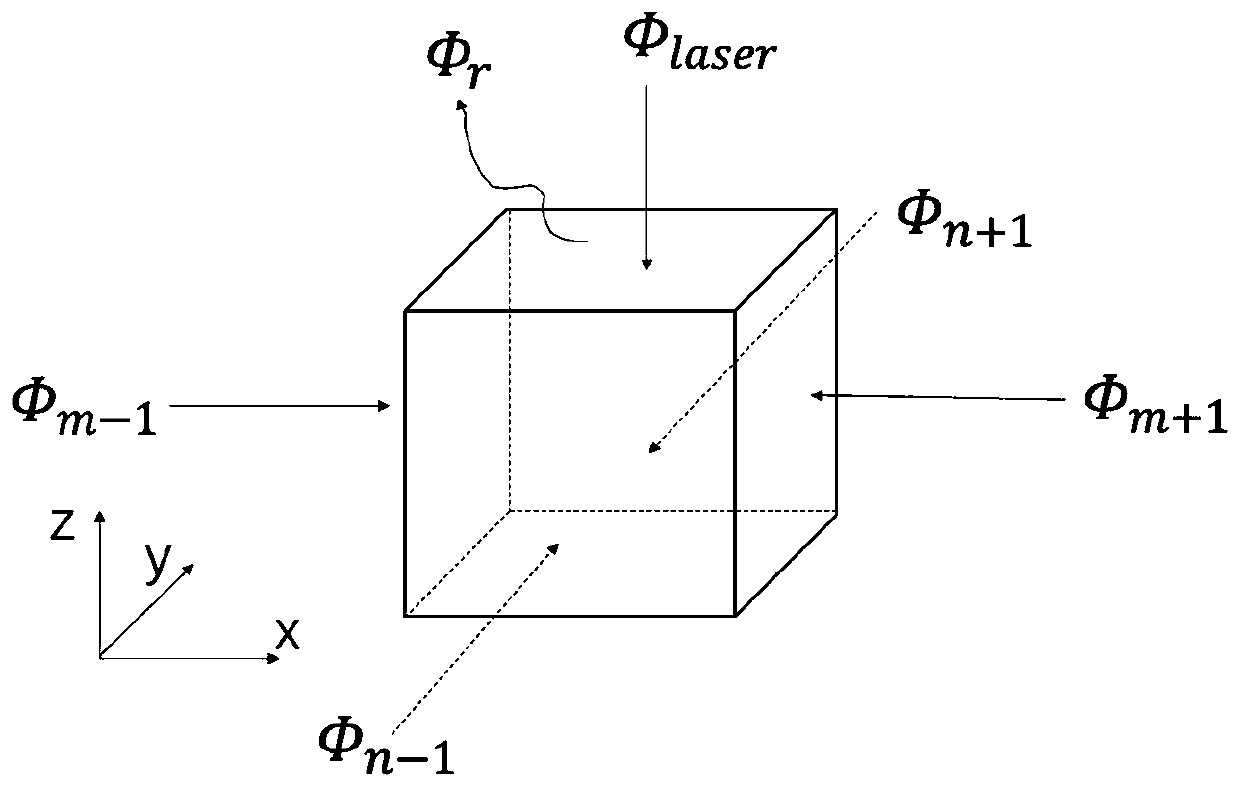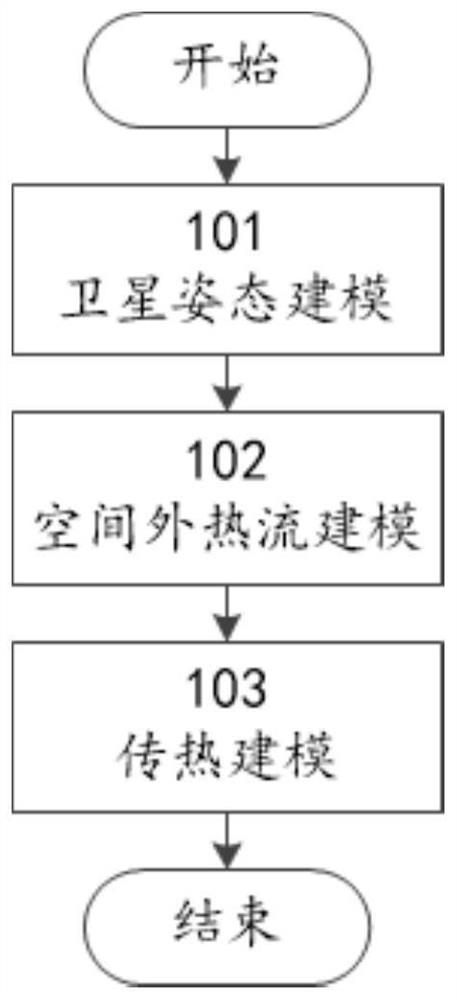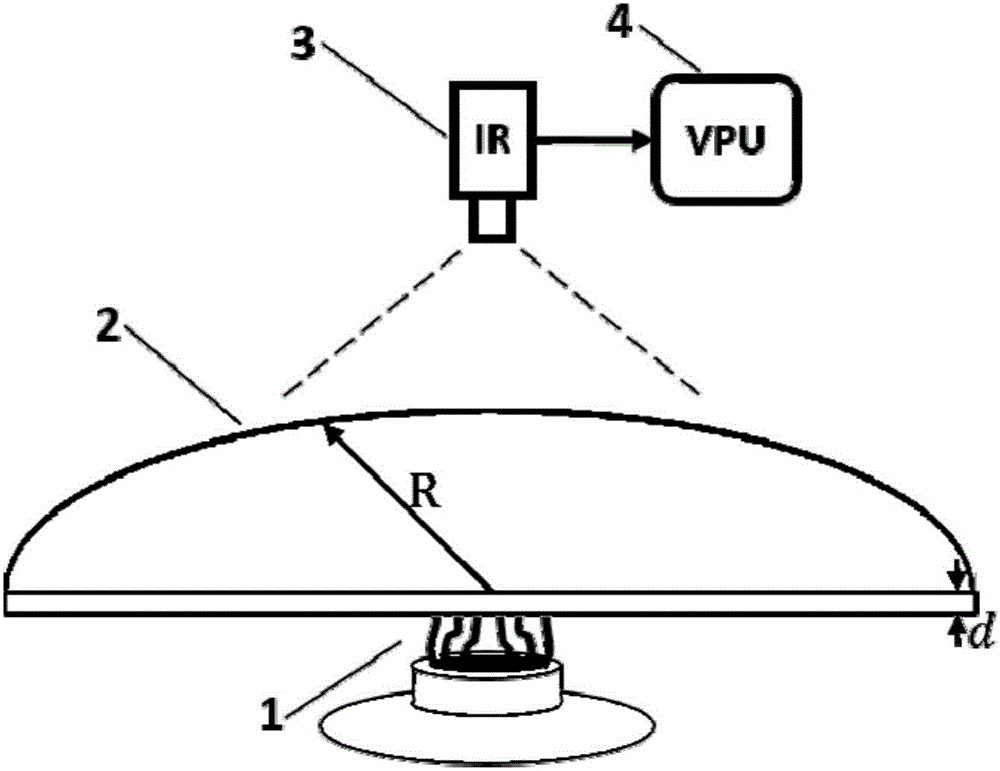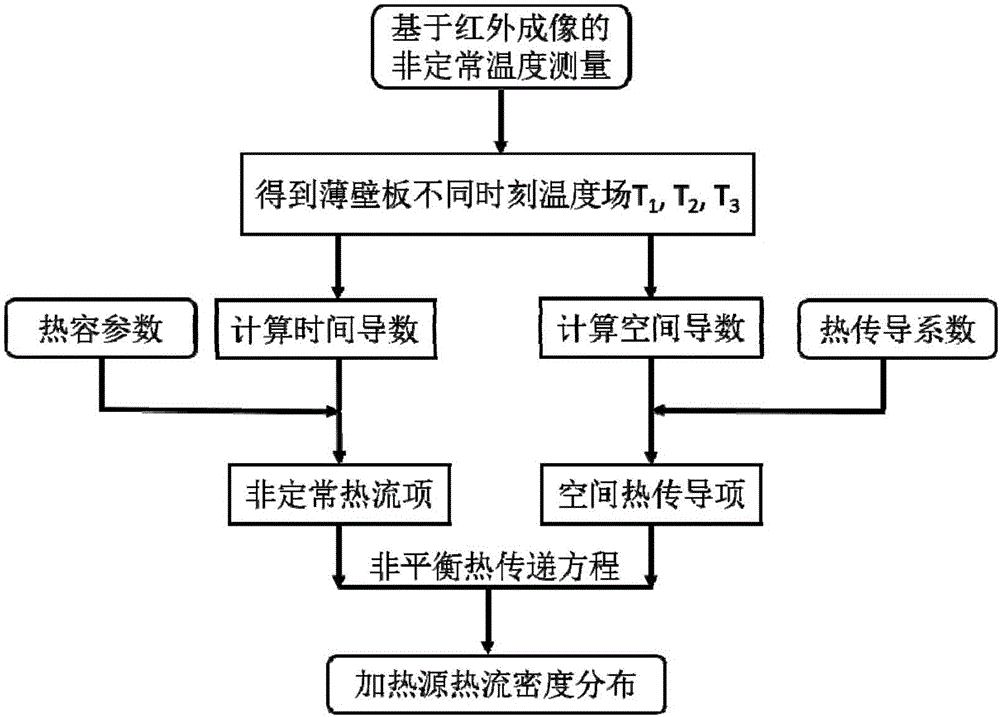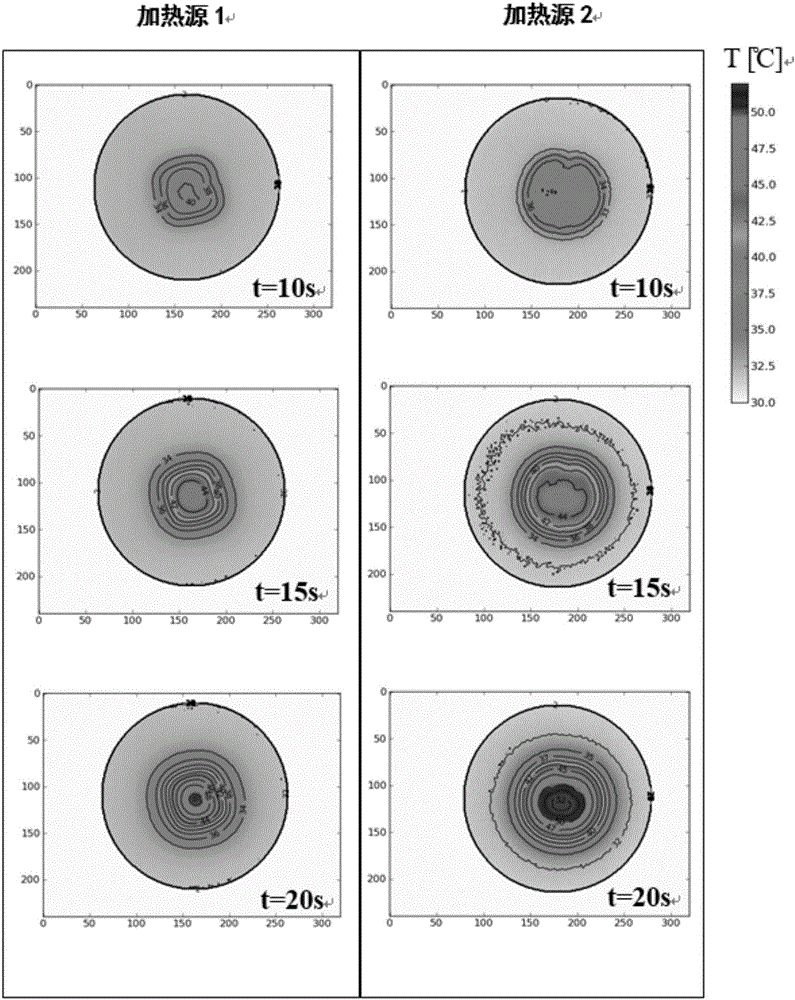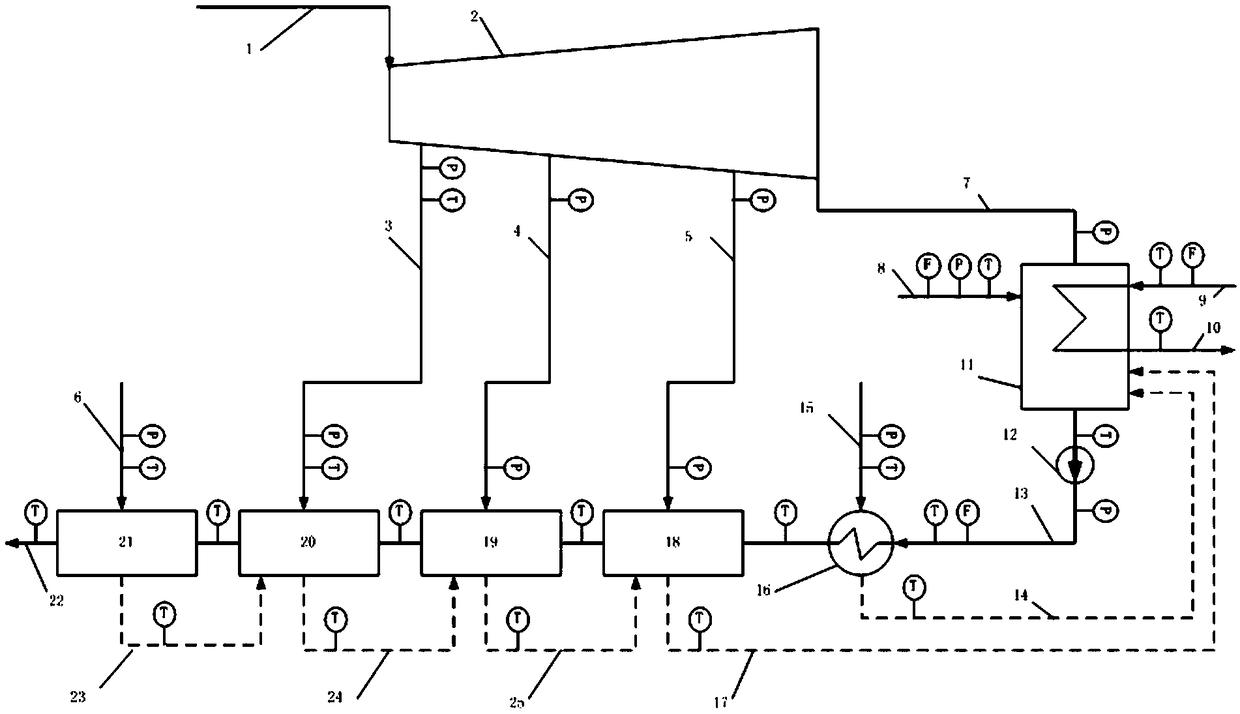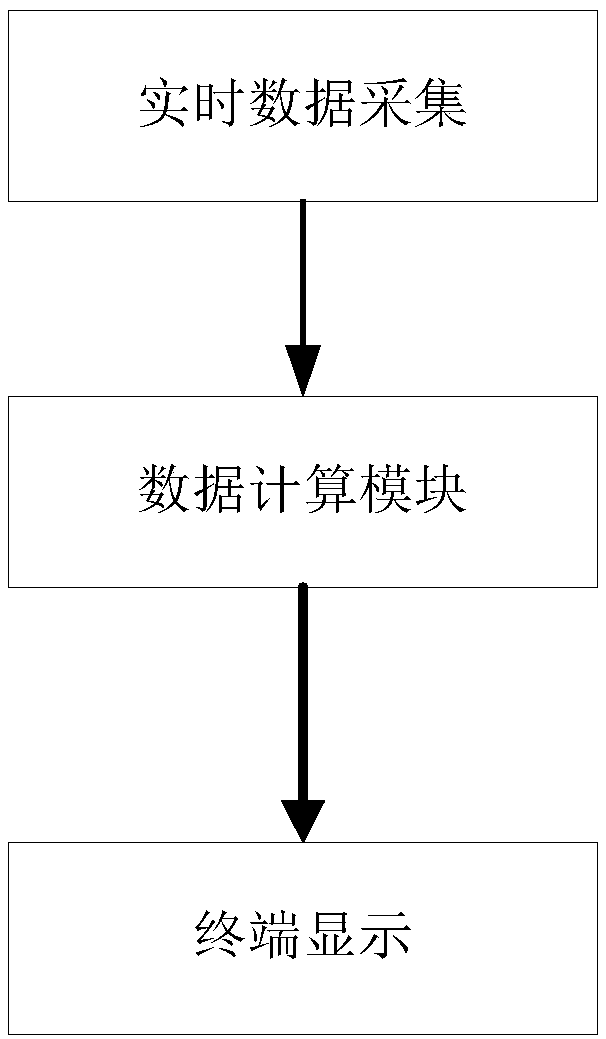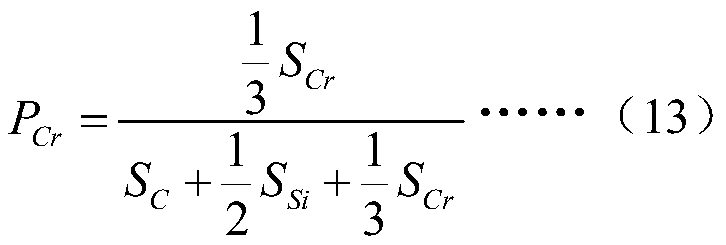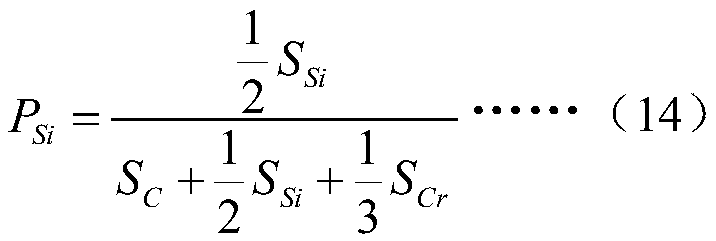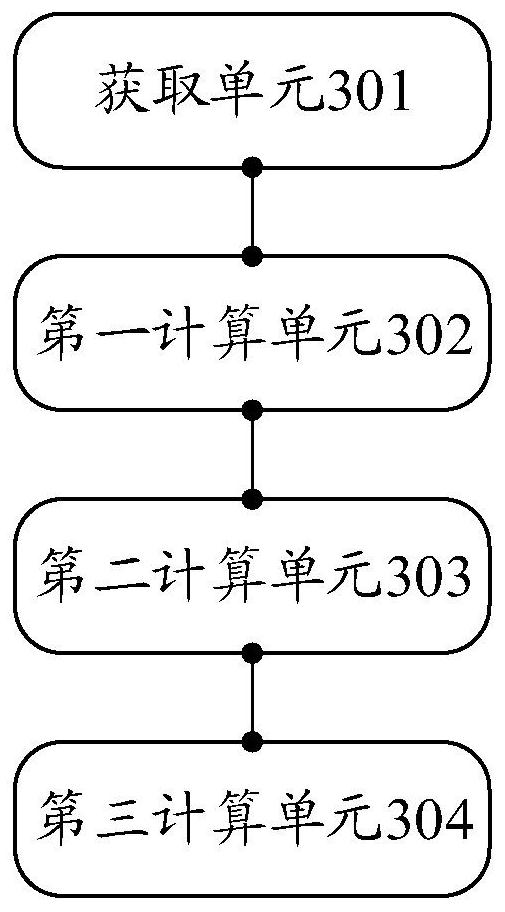Patents
Literature
Hiro is an intelligent assistant for R&D personnel, combined with Patent DNA, to facilitate innovative research.
190 results about "Heat balance equation" patented technology
Efficacy Topic
Property
Owner
Technical Advancement
Application Domain
Technology Topic
Technology Field Word
Patent Country/Region
Patent Type
Patent Status
Application Year
Inventor
A mathematical equation that describes the net flow rate of exchanges of heat (gains and losses) to a human in a given environment. The conceptual heat balance equation (Parsons 2010) is: M–W = E + RHE + C + K + S.
Method for partitioning total output of single shaft gas-steam combined cycle generating set
InactiveCN101699046AGas turbine plantsCombined combustion mitigationCombustion chamberGas compressor
The invention discloses a method and a system for partitioning total output of a single shaft gas-steam combined cycle generating set. The method comprises the following steps: (a) establishing a mathematical model of a gas compressor, a combustion chamber and a gas turbine; (b) acquiring a real-time production parameter of the generating set; (c) calculating the power of the gas turbine and the consumed power of the gas compressor according to the results of the steps (a) and (b); (d) deducting the consumed power of the gas compressor from the generated power of the gas turbine to obtain the output of the gas turbine; (e) listing a material balance equation and an energy balance equation for a waste heat boiler; and (f) establishing a mathematical model of a steam turbine, listing a heat balance equation for the waste heat boiler, and calculating the output of the steam turbine through the mathematical model of the steam turbine. The method and the system can master the contributions of the gas turbine and the steam turbine to the total output of the set and the performance of each key part in real time so as to perform effective adjustment and control according to the actual conditions of the set.
Owner:ZHEJIANG UNIV
Determination method of copperplate heat flux based on mass balance and heat balance continuous casting mould
The invention discloses a determination method of copperplate heat flux based on mass balance and heat balance continuous casting mould, which belongs to the field of numerical calculation and application in ferrous metallurgical continuous casting process. The method comprises the steps of (1) acquiring raw data, (2) acquiring the consumption rate of mould powders,(3) acquiring molten slag layer thickness (d1) and solid slag layer thickness (ds) by utilizing the equation models of mass balance and heat balance,(4) acquiring heat-flow density q, (5) constructing the physical model of crystallizers, calculating thermocouple temperature Tc and comparing the calculated value Tc with the measured value Td. The above method has the advantages of coupling the mass balance of mould powder consumption and the energy balance of molten steel heat transfer. According to the method of the invention, specific boundary condition equations are obtained by regression method after the temperature and heat flow value of specific locations being determined, without being heavily dependent on specific equations of heat transfer boundary.
Owner:NORTHEASTERN UNIV
Method for calculating power cable real-time emergency carrying capacity
InactiveCN103439609AAvoid conservative operations such as power cutsReduce economyElectrical testingElectrical conductorLimit value
The invention discloses a method for calculating power cable real-time emergency carrying capacity. The method includes the steps of firstly, establishing a cable system transient state thermal circuit model; secondly, establishing a heat balance equation; thirdly, obtaining a general solution of the heat balance equation; fourthly, obtaining the expression of the temperature of a conductor according to the initial condition; fifthly, converting the expression of the temperature of the conductor into the expression of the real-time emergency carrying capacity; sixthly, measuring or calculating the environment temperature and the temperature of the conductor at the initial moment; seventhly, determining the time of the N-1 fault repairing period or the time of the peak electricity consumption period and the limit value of the temperature of the cable conductor; eighthly, calculating real-time emergency carrying capacity of a cable. The method has the advantages that the maximum carrying capacity, namely, the real-time emergency carrying capacity, which enables the temperature of the cable conductor to rise to the limit value in a certain period of time is calculated, the scientific and reasonable decision foundation is provided for power grid dispatch and power line repairing in the emergency situation, and the calculation can be easily and conveniently conducted.
Owner:SOUTH CHINA UNIV OF TECH
System for measuring and calculating dynamic transmission capacity of high voltage transmission line and method thereof
ActiveCN102313853AFree installationEliminate the possibility of maintenance after failureElectrical testingCarrying capacityEngineering
A system for measuring and calculating dynamic transmission capacity of a high voltage transmission line comprises: a reference lead, which is arranged around a transmission line and whose direction is parallel to the transmission line, wherein the reference lead and the transmission line are respectively provided with temperature sensors and connected with wireless sending modules, the each temperature sensor measures temperatures of the reference lead and the transmission line at a certain time interval and the each wireless sending module emits the temperatures; a computer, which accepts data and carries out calculation so as to acquire real time allowable current-carrying capacity of the lead. In the invention, sunshine radiation can be substituted and the allowable current-carrying capacity of the transmission line can be calculated without using a sunshine radiation sensor. A transient thermal equilibrium formula equation is used to solve a heat transfer coefficient. And a steady heat balance equation is used to calculate the real time allowable current-carrying capacity of the transmission line based on the heat transfer coefficient. In the invention, operation is simple, labor intensity is small, the sunshine radiation sensor is not needed and costs can be reduced.
Owner:ELECTRIC POWER RES INST OF GUANGDONG POWER GRID +1
Distributed energy system energy optimization regulation and control method fusing demand side response
ActiveCN105207205AImprove economyReduce economySingle network parallel feeding arrangementsAc network load balancingEnergy system optimizationProcess engineering
The invention discloses a distributed energy system energy optimization regulation and control method fusing demand side response. The method includes the steps that a distributed energy system optimization regulation and control model is established, and the response capacity of user refrigeration equipment is introduced to participate in distributed energy system optimization operation; through considering the heat balance equation of an intra-system building, a mathematical relation between obtained user indoor temperature and output of the refrigeration equipment is described in a quantified mode. On the basis of meeting the requirement for comfort of a user in energy using, dependency on a battery energy storage system is reduced, and economy of distributed energy system operation is effectively improved; the distributed energy system optimization regulation and control model is established, the response capacity of the user side refrigeration equipment is introduced to participate in distributed energy system optimization operation, meanwhile, through considering the heat balance equation of the intra-system building, the mathematical relation between the obtained user indoor temperature and output of the refrigeration equipment is described in the quantified mode, and the comfort of the user is guaranteed. The result shows that through introduction of the user demand response, the energy-using cost can be effectively lowered.
Owner:STATE GRID TIANJIN ELECTRIC POWER +1
Method for measuring drainage pump output of low pressure heater system of thermal generator set based on energy balance
InactiveCN101737311AEnsure safetyGuaranteed economyPump testingPositive-displacement liquid enginesEnergy balancedEngineering
The invention relates to a method for measuring the drainage pump flow of a regenerative system of a thermal generator set based on energy balance. A thermodynamic system in the method consists of low pressure heaters connected in series. The method comprises the following steps of: mixing drained water of a first-stage low pressure heater with outlet condensed water of the first-stage low pressure heater by using a drainage pump, wherein the drained water of the other low pressure heaters of all stages flows automatically stage by stage; acquiring the extraction temperature and pressure, the outlet water temperature and pressure and the drained water temperature of each low pressure heater from a database of a plant-level supervisory information system (SIS) or a decentralized control system (DCS) of a thermal power plant; calculating the stream extraction enthalpy value of each low pressure heater, the outlet water enthalpy value of the low pressure heater and the drain water enthalpy value of the low pressure heater; establishing a heat balance equation for each low pressure heater, and establishing a flow balance equation and a mixing point heat balance equation for a mixing point of outlet water of the drainage pump of the first-stage low pressure heater; deducing an iteration-free soft measurement model according to the balance equations, and calculating flow shares of the drainage pump; and finally, calculating the drainage pump flow according to a flow detection value of the condensed water.
Owner:SOUTHEAST UNIV
Town thermal island characteristic prediction technique and system based on digital image analysis
The invention provides a prediction method and a system for protecting a town heat island characteristics which are based on the digital image analysis, and relates to the field of environmental engineering. A town digital elevation model DEM is established according to a town planning map; a flow region network model is established by taking the flow region of buildings as a 'node' and taking the flow opening as a 'branch'; the mass conservation equation, the loop pressure equation, the flow relation equation and the heat balance equation are established according to the flow region network model; the air mass flux, the pressure difference and the air temperature between the town buildings are calculated, and the flow region in which each pixel is positioned is identified; the direct solar radiation, the diffuse solar radiation, the long-wave radiation and the reflected radiation energy distribution of an analysis surface are calculated; the specific heat, the density and the thermal coefficient of each pixel in an underlying surface image are obtained; therefore the temperatures of the underlying surface and each wall surface are calculated, and the town heat island characteristics are predicted. The invention uses the digital image processing technology, and thus the problem of dynamic boundary in a town outdoor heat environment is successfully solved; the purpose of optimizing the town heat environment is realized.
Owner:CHONGQING UNIV
Method and device for evaluating outlet temperature optimization and energy-saving effects of coal mills
ActiveCN107066657AEasy to manage statisticsSolid fuel pretreatmentTechnology managementAir volumeEngineering
The invention discloses a method and device for evaluating outlet temperature optimization and energy-saving effects of coal mills. The method comprises the following steps of: obtaining a heat balance equation; obtaining a relational expression between inlet air temperature change and outlet air temperature change of a coal mill according to the heat balance equation; obtaining a hot primary air increase proportion caused by outlet temperature promotion of the coal mill; obtaining a proportion of a hot primary air volume in a total primary air volume under any operation condition of a unit; and obtaining smoke discharging temperature reduction numerical value, at the outlet of an air-pre-heater, caused by temperature rise of the coal mill according to preset data of typical working conditions of the unit, so as to obtain energy-saving evaluation. According to the method, real-time fitting calculation can be carried out on the specific effect of the influences, on boiler thermal efficiency, of economic working-condition operation of the coal mill, so that the energy-saving effect can be intuitively fed back to the operation personnel, convenience is brought to the statistical management of economic and technological indexes, and simplicity and convenience are provided.
Owner:BEIJING YUANSHEN ENERGY SAVING TECH
Dual-redundancy permanent magnet synchronous motor temperature rise calculation method based on equivalent thermal network model
ActiveCN107391884AThe temperature field takes less timeShort timeDesign optimisation/simulationSpecial data processing applicationsElectrical conductorPermanent magnet synchronous motor
The invention discloses a dual-redundancy permanent magnet synchronous motor temperature rise calculation method based on an equivalent thermal network model. The method includes: building the three-dimensional equivalent thermal network model, solving heat resistance and heat sources, building a thermal balance equation, and solving to obtain the temperature rise of each temperature rise node of a motor. The method has the advantages that the special small-tooth structure of a dual-redundancy permanent magnet synchronous motor with low-heat coupling and without electromagnetic coupling among various phases of windings is considered in modeling, the windings in grooves adopt a double-layer equivalent model with two layers of conductors and two layers of insulators being arranged in a contacted and spaced manner, the temperature rise nodes are built at other solid part nodes and fluid area nodes, contacted different nodes are connected through equivalent resistors, parts contacting with external environment nodes are connected with the external environment nodes through convection radiating resistors, and the heat sources are distributed at active nodes; when the method is used for calculating the temperature rise, calculation quantity is moderate, time consumption is low, accuracy is high. And the obtained temperature rise result can be used for guiding the determination of the motor insulating level and the configuration of a cooling manner.
Owner:TIANJIN UNIV
Industrial unit dichloroethane cracking furnace coupled modeling method and application
ActiveCN102779203APreparation by hydrogen halide split-offSpecial data processing applicationsAbsorption capacityReal-time data
The invention relates to an industrial unit dichloroethane cracking furnace coupled modeling method and application. In the method, during modeling, a dichloroethane cracking furnace is divided into a hearth model and a furnace tube model, a one-dimensional partition method in combination with method is used for the hearth, the smoke temperature distribution condition of the hearth is solved by a heat balance equation, for the furnace tube model, the furnace tube is partitioned according to the amount of straight tube sections of a radiant section, and the reaction and the heat absorption capacity in the tube are calculated section by section. The hearth model and the furnace tube model are mutually iterated through a quasi-newton method according to the calculated smoke temperature and heat transfer rate information, until meeting the convergence precision and the model precision. The model is based on the dynamical model and the energy conservation relation, and is corrected by real-time data so as to further measure the relevant parameters of the cracking furnace in a soft sensing manner. The accurate model is the basis of optimization, provides reliable model basis for optimization of field important economic indicators, such as the outlet temperature of the furnace tube of the cracking furnace, the dichloroethane cracking conversion rate, the selectivity, the unit consumption and so on, and realizes real-time soft sensing of relevant parameters.
Owner:EAST CHINA UNIV OF SCI & TECH
Cooling method and structure of closed type cooling system
ActiveCN103491749AEasy to analyzeWith early warning functionHeat exchange apparatusCooling/ventilation/heating modificationsSoftware engineeringSystem structure
The invention provides a cooling method of a closed type cooling system. The cooling method specifically includes the steps that firstly, fans needing to be started in an air-water heat exchanger are determined according to the heating amount of a cooled object, and the fan is started; secondly, whether the cooling capacity is sufficient or not is predicted according to the heat balance equation of cooling liquid, when the cooling capacity is insufficient, a standby fan is started by the air-water heat exchanger, and if all the fans are started, alarming is performed by the closed type cooling system; the open value of a tee valve is calculated when the closed type cooling system is dynamically stable according to the function relation between the heating amount of the cooled object and the opening degree of the tee valve, and the practical opening size of the tee valve is kept in the open value. The air-water heat exchanger is composed of three fans which are different in capacity, and seven load sections are combined by the arrangement of the three fans so as to adapt to different demands of the closed type cooling system. The cooling method of the closed type cooling system improves the structure of the system, output temperature is constant, intelligence control is achieved, the early warning function is achieved, and the cooling method of the closed type cooling system is capable of saving energy, friendly to the environment, safe and practical.
Owner:DONGFANG ELECTRIC AUTOMATIC CONTROL ENG CO LTD +1
Interface point method modeling of the steam-assisted gravity drainage production of oil
InactiveUS20150094999A1Accurate modelingSimulation is accurateFluid removalComputation using non-denominational number representationMomentumInterface point
A computer system and method of simulating the behavior of an oil and gas reservoir including movement of the steam-bitumen interface during oil production using the Steam Assisted Gravity Drainage (SAGD) technique. A system of equations including state equations involving momentum and heat transport for each phase, mass conservation equations, and heat balance equations, in combination with a continuity constraint, is defined and discretized for the modeled volume. A material point model technique for numerically solving the system of discretized equations is applied, where interface marker particles that move through the Eulerian grid represent the location of points along the steam-bitumen interface.
Owner:BP CORP NORTH AMERICA INC
Simultaneous reconstruction method for temperature field and heat flow of structure body with three-dimensional or curved surface shape
ActiveCN106897537AOvercome limitationsSolve the problem of not being able to obtain three-dimensionalGeometric CADSpecial data processing applicationsHeat flowHeat transmission
The invention relates to a simultaneous reconstruction method for a temperature field and heat flow of a structure body with a three-dimensional or curved surface shape. The method comprises the following steps that 1, distribution of a three-dimensional surface temperature field of the structure body is acquired to serve as a boundary solving condition of a heat-conduction differential equation; 2, the local interior temperature of the structure body is acquired to serve as a limitation solving condition of the heat-conduction differential equation; 3, a heat balance equation of the cooling channel wall surface is built according to a heat flow value of heat transmission between fluid and the cooling channel wall surface to serve as a boundary solving condition of the heat-conduction differential equation; 4, a complete control equation set is obtained by utilizing the heated surface temperature of the structure body, the heat balance equation on the interior boundary and the local interior temperature and combining the heat-conduction differential equation; 5, the control equation set is solved, and the temperature field and the heat flow density of the structure body are determined simultaneously.
Owner:TSINGHUA UNIV
Heat-network modeling method for determining maximum value of steady-state temperature of heat conduction in radial direction
InactiveCN102592024ASolving speed is fastIntuitive modelingSpecial data processing applicationsSteady state temperatureEngineering
The invention provides a heat-network modeling method for determining the maximum value of steady-state temperature of heat conduction in a radial direction, which is applied to the heat conduction of a circular wall cylinder structure. The method provided by the invention comprises the following steps: firstly, using a network with the maximum value of the steady-state temperature of the heat condition in the radial direction to establish a heat-network model of a research object, determining the temperatures of all nodes in the established heat-network model through a heat balance equation,then according to the temperatures of the inner surface and the outer surface of each circular wall cylinder, determining the distribution of the maximum value point rmax of the steady-state temperature of the heat conduction of each circular wall cylinder in the radial direction, and finally, according to the distribution of the maximum value point rmax of the temperature, designing an error compensation link, finally, obtaining the maximum value of the steady-state temperature of the heat conduction of each circular wall cylinder in the radial direction.. According to the method of the invention, the maximum value of the steady-state temperature of the heat conduction in the radial direction of the circular wall cylinder can be determined by the heat-network method, the determined maximum value of the temperature is accurate, the calculation speed is high, the modeling is intuitive, and the obtained value can be further used for analyzing the heat conduction problem of electronic devices.
Owner:BEIHANG UNIV
Estimation method of lithium ion battery thermal runaway reaction heat
ActiveCN104614677AKnow the size of the riskThermometers using electric/magnetic elementsElectrical testingMathematical CalculusEstimation methods
The invention discloses an estimation method of lithium ion battery thermal runaway reaction heat; the method comprises the following steps: collecting temperature data of a blank battery and a tested lithium ion battery; importing the temperature data of the blank battery into a data processing software, using a calculus heat balance equation 1 to process the temperature data, so as to obtain a heat loss rate in each time interval, then fitting an average value of temperature in the time interval with the heat loss rate in order to obtain a relationship equation of the heat loss rate and temperature; importing the temperature data of the tested lithium ion battery into the data processing software, calculating the heat loss rate of the tested lithium ion battery at a certain time based on the relationship equation of the heat loss rate and the temperature, substituting the heat loss rate into a calculus heat balance equation 2, so as to obtain a reaction heat of the materials inside the tested lithium ion battery in any stage, summing the reaction heat of all stages in order to obtain the lithium ion battery thermal runaway reaction heat. The disclosed method is reliable in result; the danger degree of the battery can be recognized by estimating the reaction head of the lithium ion battery under different states.
Owner:NANJING UNIV OF TECH
Overhead line dynamic current-carrying capacity advanced prediction method and system
ActiveCN110321601AImprove forecast accuracyImprove current carrying capacityDesign optimisation/simulationSpecial data processing applicationsCarrying capacityModel selection
The invention provides an overhead line dynamic current-carrying capacity advanced prediction method and system, and the method comprises the steps: obtaining the meteorological historical data of thesurrounding environment of an overhead line, and converting the meteorological historical data into time sequence data with the same time interval; training and learning the time series data by adopting a recurrent neural network introducing an attention mechanism to predict the meteorological data of the surrounding environment of the overhead line in the future; according to the prediction result of the meteorological data, in combination with a steady-state heat balance equation, giving overhead line model parameters and the highest allowable temperature thereof, and calculating the dynamic current-carrying capacity and the transmission capacity of the overhead line; respectively predicting a plurality of monitoring points of the overhead line and calculating the dynamic current-carrying capacity and the transmission capacity, and taking the minimum value of all the monitoring points as the final result of the dynamic current-carrying capacity and the transmission capacity of the overhead line at the moment. A recurrent neural network of an attention mechanism is introduced for prediction, so that a training model selectively pays attention to input strongly related to a target, and the prediction precision is improved.
Owner:SHANDONG UNIV
Overhead line dynamic capacity increase method based on BOTDR thermometric technique
ActiveCN106684864ALow costPlay real capacityThermometers using physical/chemical changesAc network circuit arrangementsCarrying capacitySimulation
The invention relates to an overhead line dynamic capacity increase method, in particular to an overhead line dynamic capacity increase method based on the BOTDR thermometric technique. By means of the BOTDR thermometric technique on an OPGW, distributed measurement is conducted on environment temperatures around an overhead line, a wire temperature is derived through the Newton iteration method, and a bottleneck point of the wire real-time temperature is put into a new heat balance equation, so that a real-time current-carrying capacity is calculated. It is proved by calculation that the line current-carrying capacity can be effectively improved by means of the method, and the method plays a theoretical guiding role is played on design optimization of the line current-carrying capacity. In the method, no extra temperature sensing device is needed, the cost of a common DTP device is reduced, maintenance is simple and reliability is high. The method can be widely used in power grids, and the real capacity of a power transmission line is produced.
Owner:WUHAN UNIV
Electric heating combined dispatching model considering heat load elasticity and heat supply network characteristics for wind power consumption
PendingCN110232640AFully exploit the regulatory potentialMeet the heat demand of the loadData processing applicationsDesign optimisation/simulationElectric heatingHeat balance equation
The invention provides an electric heating combined dispatching model considering heat load elasticity and heat supply network characteristics for wind power consumption, which comprises the followingsteps of: (1) analyzing the heat use comfort level of a heating user, and setting a PMV segmented limited range according to different day and night comfort level requirements of the user; (2) considering the required elasticity of the heat load, and converting the traditional heat balance equation constraint into an interval constraint; and (3) taking minimum total coal consumption and maximum wind power acceptance as an optimization target, and establishing an electric heating combined dispatching model considering heat supply network characteristics and heat load elasticity. The model is beneficial to broadening of a new idea of promoting wind power consumption by mining the adjustment potential of the demand side, and provides reference for electric heating economic dispatching underwind power integration.
Owner:NORTH CHINA ELECTRIC POWER UNIV (BAODING)
Method and device for measuring temperature of temperature field
ActiveCN106197751AAvoid damageHigh measurement accuracyThermometers using electric/magnetic elementsUsing electrical meansDiscretizationMeasurement precision
The invention relates to the technical field of temperature measurement, in particular to a method and device for measuring the temperature of a temperature field. The method for measuring the temperature of the temperature field comprises the steps that 1, a temperature measuring module is divided into m grid cells; 2, current flowing through the temperature measuring module, voltages across the two ends and position data of each grid cell are acquired, and the equivalent resistance of the temperature measuring module and the temperature initial value and the heat conductivity coefficient initial value of each grid cell are calculated; 3, a heat balance equation of the temperature measuring module is established in combination with the density value and specific heat capacity value and parameter values of the temperature measuring module based on the first kind of boundary conditions; 4, the heat balance equation is subjected to discretization, the total resistance value of the temperature measuring module is calculated and acquired through a tabu search algorithm, and when the difference between the equivalent resistance and the total resistance value is smaller than the value A, calculation is stopped. According to the method for measuring the temperature of the temperature field, temperature distribution on the linear or planar temperature field on an object to be measured can be obtained at a time, and measurement precision is high.
Owner:中节能工程技术研究院有限公司
Method for analyzing critical icing type based on numerical simulation model
PendingCN111967201AImprove accuracyDesign optimisation/simulationCAD numerical modellingCritical conditionGeometric modeling
The invention discloses a method for analyzing a critical icing type based on a numerical simulation model. The method comprises steps of building a two-dimensional wire geometric model and an air flow field model, and solving to obtain air flow field distribution; a water drop stress balance equation being established, a water drop motion equation being obtained according to the water drop stressbalance equation, a water drop motion track being obtained according to the water drop motion equation and the air flow field distribution, and a wire collision coefficient being obtained according to the water drop motion track; establishing a wire icing heat balance equation, and establishing a wire icing freezing coefficient according to the wire icing heat balance equation; and obtaining critical conditions of the glaze and the rime, combining the conductor collision coefficient and the conductor icing freezing coefficient to obtain a change relationship of the critical environment temperature and the critical liquid water content along with external environment factors under the critical conditions of the glaze and the rime, and judging the icing type according to the change relationship and actual meteorological conditions. The method can be widely applied to power transmission line icing type prediction.
Owner:SOUTH CHINA UNIV OF TECH
Large-space delaminated air-conditioning load calculation method based on surface thermal balance
ActiveCN106934247AAccurate internal surface temperatureNo radiation transfer heat loadSpecial data processing applicationsInformaticsHeat balance equationEnergy equation
The invention relates to a large-space delaminated air-conditioning load calculation method based on surface thermal balance. The calculation method comprises the following steps that: S1: for a large-space building external envelope structure and a ground inner wall surface, carrying out energy analysis, establishing a heat balance equation of each inner surface of any inner wall surface; S2: according to the heat balance equation of any inner wall surface in the S1, establishing the energy equation of n pieces of inner wall surfaces of the large-space building; S3: carrying out analysis calculation on heat transferred to an air-conditioning area from a non-air-conditioning area to obtain an air heat balance expression of the non-air-conditioning area; and S4: carrying out energy analysis calculation on the air-conditioning area to obtain a large-space delaminated air-conditioning load expression. By use of the large-space delaminated air-conditioning load calculation method based on surface thermal balance, the large-space delaminated air-conditioning load calculation method with a clear concept and a specific physical meaning is provided, and the deficiency of large load errors formed by heat of transfer in the prior art is solved.
Owner:UNIV OF SHANGHAI FOR SCI & TECH
Method and system for obtaining temperature rise of high-tension overhead transmission line
InactiveCN106482849AThermometers using electric/magnetic elementsUsing electrical meansCarrying capacitySkin effect
The invention provides a method and system for obtaining temperature rise of a high-tension overhead transmission line. On the basis of a heat balance equation, a product of a skin effect coefficient and an iron loss coefficient is used to calculate the AC / DC resistance ratio. The AC / DC resistance ratio is a nonlinear function of current-carrying capacity and temperature, the equation to be solved is complex, but a result is more accurate. A Newton iterative method is used to solve the equation, the steps for calculating the current-carrying capacity and temperature are provided, and the relation of the AC / DC resistance ratio and the current-carrying capacity in different environmental conditions is calculated. Via calculation, the temperature rise value of the high-tension overhead transmission line is calculated.
Owner:BEIJING XJ ELECTRIC +1
Novel method for evaluating stability of one-base propellant within 10-year storage period through microcalorimetry
ActiveCN107478674AHigh risk of samplingPracticalMaterial heat developmentEngineeringHeat balance equation
The invention discloses a novel method for evaluating stability of a one-base propellant within a 10-year storage period through microcalorimetry. The method is characterized in that the stability reaction kinetics is researched by tracking micro heat released or absorbed by the one-base propellant at every moment, a time-temperature equivalent relation of the storage process is established, the heat accumulation effect is researched according to a heat balance equation established through heat generation and heat conduction, thus, a heat explosion critical criterion is obtained, microcalorimetry evaluation rules, covering size effects, about storage safety of the one-base propellant are formed, the evaluation rules are compared according to heat response signals output according to a microcalorimetry test when storage safety is evaluated, and the evaluation result of the stability within the 10-year storage period is given. The stability of the one-base propellant within the 10-year storage period is evaluated through microcalorimetry, the stability within 10-year storage period can be given within 10 days, and the measurement process is rapid, safe, nondestructive, environmentally friendly and convenient.
Owner:XIAN MODERN CHEM RES INST
Method and device for measuring heat conductivity coefficient and thermal diffusion coefficient of film material under strains
ActiveCN111060555AEasy to operateAvoid the effects of convective heat transferMaterial thermal conductivityMaterial heat developmentThermal diffusion coefficientThermal coefficient
The invention discloses a method and device for measuring a heat conductivity coefficient and a thermal diffusion coefficient of a film material under strains. A sample is tensioned through a tensioning mechanism; the sample, the tensioning mechanism and a driving mechanism are placed in a vacuum cavity; the sample is heated by laser; a whole-process temperature distribution diagram of the samplefrom heating to a steady state under a fixed strain is obtained through an infrared camera; the film is regarded as two-dimensional heat transfer; an experimental picture is processed to obtain the temperature of each pixel point on the film surface; the film is divided into a plurality of micro elements according to the size of the pixel points; steady-state and transient-state heat balance equations are established; the heat conductivity coefficient and the heat diffusion coefficient of the film at different temperatures are solved; the sample is driven to generate different strains by a driving mechanism; and the condition that the heat conductivity coefficient and the heat diffusion coefficient of the sample change along with the temperature under different strains is solved. The method is convenient to operate and high in measurement accuracy, and can obtain the condition that the heat conductivity coefficient and the thermal diffusion coefficient of the sample change along with the temperature under different strains.
Owner:WUHAN UNIV
Small satellite dynamic thermal analysis modeling method
PendingCN111753375ARealize the solutionGeometric CADDesign optimisation/simulationHeat flowHeat analysis
The invention discloses a small satellite dynamic thermal analysis modeling method. Firstly, satellite attitude modeling is performed according to satellite orbit information parameters and attitude parameters; the relative relationship among the satellite, the earth and the sun is obtained; then, based on the discrete outer surface grids, parallel light shielding judgment is carried out, an orbitcalculation process is combined, space outer heat flow is solved, finally, a general heat balance equation is used, radiation heat exchange between satellite surfaces and heat dissipation to a cold background are combined, satellite surface heat exchange boundary conditions are determined, and a continuous temperature field is calculated.
Owner:INNOVATION ACAD FOR MICROSATELLITES OF CAS +1
Transformation method for solving problem of lower flue gas temperature of inlet of denitrification device of boiler in thermal power plant
ActiveCN104785104AIncreased inlet flue gas temperatureMeet minimum continuous ammonia injection flue temperature requirementsDispersed particle separationSuperheaterHeat balance equation
The invention relates to transformation technologies for denitrification devices of boilers in thermal power plants, in particular to a transformation method for solving the problem of the lower flue gas temperature of an inlet of a denitrification device of a boiler in a thermal power plant, and solves the problem that the SCR (selective catalytic reduction) denitrification device cannot run due to the lower flue gas temperature of the inlet of the SCR denitrification device. The transformation method for solving the problem of the lower flue gas temperature of the inlet of the denitrification device of the boiler in the thermal power plant comprises steps as follows: a, collecting data of the thermal power plant; b, taking the flue gas temperature of an outlet of an economizer as a Y-coordinate, taking the unit load as an X-coordinate, and incorporating the Y-coordinate and the X-coordinate into an MATLAB (matrix laboratory) coordinate system; c, additionally mounting a bypass flue between an inlet of a horizontal low-temperature superheater and the outlet of the economizer; d, introducing flue gas temperatures of an outlet of a vertical low-temperature superheater and flue gas temperatures of the outlet of the economizer under different unit loads into a thermal equilibrium equation; e, testing multiple kinds of fed coal actually used in the thermal power plant. The method is applicable to transformation of the denitrification device of the boiler in the thermal power plant.
Owner:SHANXI UNIV
Unsteady wall heating flow distribution measurement method based on infrared thermography temperature measurement
InactiveCN106885634AEngineering majorHigh productivityPyrometry for temperature profileTemporal changeHeat flow
The invention discloses an unsteady wall heating flow distribution measurement method based on infrared thermography temperature measurement. The method is characterized by recording the time-varying temperature field of a heated wall by using infrared thermography; obtaining an unsteady heat balance equation because a selected object has a uniform wall thickness and is low in thermal resistance in the thickness direction and thus a wall heating problem can be simplified into two-dimensional unsteady heat transfer problem; then, taking the derivatives of the temperature field with respect to time and space, ignoring natural convection and heat radiation, and calculating a heating flow in two-dimensional distribution. The non-contact heat flow measuring method can measure the two-dimensional distribution of wall heat flow in real time.
Owner:ZHEJIANG UNIV
Online monitoring system and method of exhaust steam enthalpy value of low pressure cylinder of steam turbine
PendingCN109211439ASimplify the build processAvoid Cumulative ErrorsCalorimeterMonitoring systemEngineering
The invention provides an online monitoring system and method of an exhaust steam enthalpy value of a low pressure cylinder of a steam turbine. The system is provided with sensors at the positions corresponding to a steam pipeline of a condenser, an axis heater, and four groups of low pressure heaters where steam is exhausted by the low pressure cylinder. As monitoring for flow of circulating water and temperature of inlet water and outlet water is added, the heat of the exhaust steam of the low pressure cylinder can be calculated indirectly through a cold end system; when a heat balance equation is built for a condenser of a steam turbine thermodynamic system to calculate the exhaust steam heat of the low pressure cylinder, the heat which is taken away by the circulating water system andcan be measured directly is introduced to the balance equation, building of the heat balance equation is greatly simplified and accumulated error caused by a traditional calculation method is avoided.The monitoring system only monitors parameters of a low pressure heater system and parameters of a cold end system, calculation parameters are reduced to the maximum extent, and the calculation precision of the exhaust steam enthalpy value of the low pressure cylinder can be improved efficiently.
Owner:GUODIAN NANJING ELECTRIC POWER TEST RES CO LTD
Control method for argon-oxygen refining ferrochrome carbon content based on expert internal model control
InactiveCN110229945APrevent splashThe selection range converges and tends to be reasonableSteel manufacturing process aspectsIncreasing energy efficiencyOxygenFerrochrome
The invention relates to a control method for an argon-oxygen refining ferrochrome carbon content based on expert internal model control, and relates to the technical field of Argon oxygen decarburization (AOD) furnace refining low-carbon ferrochromium alloys. According to the method, when an internal model control model is built, a form of a given filter is defined, the filter is serially connected into the internal model control model, a building method of a filter time constant expert control system is particularly given, and the filter time constant expert control system can be used for building and evaluating a filter time constant with a best performance and is used for automatically optimizing and adjusting the filter time constant in an internal model controller in the whole smelting process. According to the control method for the argon-oxygen refining ferrochrome carbon content based on the expert internal model control provided by the invention, the influence of external unmeasured disturbance on the whole smelting process can be effectively overcome, and the steady-state zero-deflection accurate control on a terminal carbon content is realized; and a heat balance equation in an AOD furnace smelting process can be accurately built, and an accurate relationship between a molten pool temperature change rate and a gas supply speed is obtained, so that the smelting efficiency of the argon-oxygen refining low-carbon ferrochromium alloy is improved.
Owner:CHANGCHUN UNIV OF TECH
Method and device for detecting current-carrying capacity of overhead transmission line
PendingCN112345864AAccurate ampacityReduce the difficulty of implementationMaterial heat developmentEnvironmental/reliability testsThermal coefficientMetal sphere
The invention discloses a method and a device for detecting the current-carrying capacity of an overhead transmission line. The method comprises the following steps: setting a metal ball body at a position in the same air environment as the overhead transmission line, enabling the metal ball body to be in a temperature steady state when the overhead transmission line operates normally, and obtaining the temperature of the metal ball body, wherein the metal ball is made of the same material as an overhead transmission line; based on the heat balance equation of the metal ball, calculating the heat exchange coefficient of the metal ball according to the temperature of the metal ball; obtaining the Reynolds number of the metal ball according to the relationship between the Nusselt number andthe heat transfer coefficient, substituting the Reynolds number of the metal ball into a Reynolds number relationship formula, and calculating to obtain the Reynolds number of the overhead transmission line; and calculating the current-carrying capacity of the overhead power transmission line according to the Reynolds number of the overhead power transmission line based on the thermal balance equation current-carrying capacity calculation formula of the overhead power transmission line. The technical problem that the current-carrying capacity detection error of the overhead power transmissionline is relatively large due to relatively low measurement precision of the environmental parameters of the overhead power transmission line in the prior art is solved.
Owner:ELECTRIC POWER RES INST OF GUANGDONG POWER GRID
Features
- R&D
- Intellectual Property
- Life Sciences
- Materials
- Tech Scout
Why Patsnap Eureka
- Unparalleled Data Quality
- Higher Quality Content
- 60% Fewer Hallucinations
Social media
Patsnap Eureka Blog
Learn More Browse by: Latest US Patents, China's latest patents, Technical Efficacy Thesaurus, Application Domain, Technology Topic, Popular Technical Reports.
© 2025 PatSnap. All rights reserved.Legal|Privacy policy|Modern Slavery Act Transparency Statement|Sitemap|About US| Contact US: help@patsnap.com
